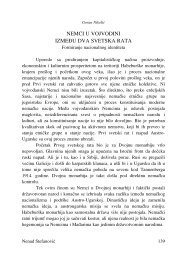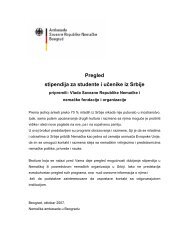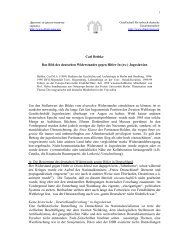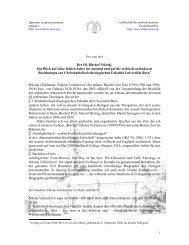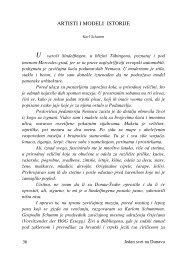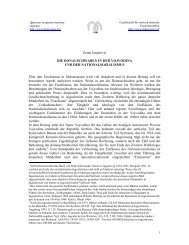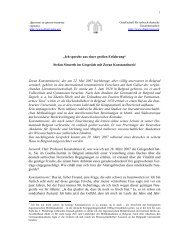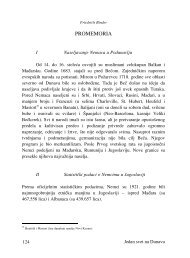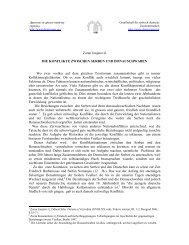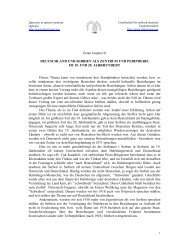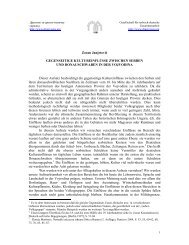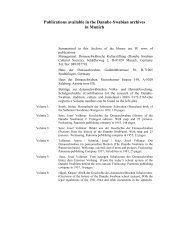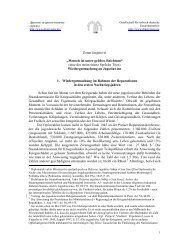The Ethnic-Germans in Political Life of Yugoslavia 1918-1941.
The Ethnic-Germans in Political Life of Yugoslavia 1918-1941.
The Ethnic-Germans in Political Life of Yugoslavia 1918-1941.
Create successful ePaper yourself
Turn your PDF publications into a flip-book with our unique Google optimized e-Paper software.
Друштво за српско-немачку<br />
сарадњу<br />
http://www.drustvosns.org<br />
1991<br />
Gesellschaft für serbisch-deutsche<br />
Zusammenarbeit<br />
http://www.drustvosns.org<br />
Zoran Janjetović<br />
THE ETHNIC-GERMANS IN POLITICAL LIFE OF YUGOSLAVIA<br />
<strong>1918</strong>-1941<br />
Participation <strong>in</strong> political life and government are one <strong>of</strong> the important <strong>in</strong>dicators <strong>of</strong><br />
quality <strong>of</strong> the status <strong>of</strong> national m<strong>in</strong>orities. In this paper we propose to <strong>in</strong>vestigate <strong>in</strong> what<br />
way and to what extent the Volksdeutsche participated <strong>in</strong> the political decision-mak<strong>in</strong>g (on<br />
national and, partly, local level) <strong>in</strong> the <strong>in</strong>ter-war <strong>Yugoslavia</strong>. <strong>The</strong> peoples and national<br />
m<strong>in</strong>orities that found themselves united under one state umbrella (<strong>in</strong> the territory which was<br />
politically reunited with<strong>in</strong> common state borders for the first time s<strong>in</strong>ce the Roman Empire),<br />
stemmed from various political, state and cultural traditions. <strong>Political</strong> systems and body<br />
politic which had dom<strong>in</strong>ated regions <strong>in</strong>habited by <strong>in</strong>dividual peoples, differed greatly <strong>in</strong> the<br />
breadth and the way population participated <strong>in</strong> public affairs, <strong>in</strong> political traditions and<br />
political culture. Furthermore, different peoples had different political priorities, and the great<br />
upheaval <strong>of</strong> <strong>1918</strong> caused some to change their political goals and tactics. This was particularly<br />
true <strong>of</strong> the national m<strong>in</strong>orities, who, found themselves <strong>in</strong> a new and alien body politic,<br />
politically cut <strong>of</strong>f from their co-nationals, and <strong>of</strong>ten barren <strong>of</strong> the privileged status the defunct<br />
empires had guaranteed, or at least provided for.<br />
<strong>The</strong> old Austria had general suffrage (to be sure, only for men) s<strong>in</strong>ce 1907 for the<br />
national Parliament, whereas the right to vote for diets <strong>of</strong> the crownlands and for the local<br />
government rema<strong>in</strong>ed archaic and restricted. 1 Hungary had a very narrow suffrage right,<br />
which was further restricted for m<strong>in</strong>orities through gerrymander<strong>in</strong>g. <strong>The</strong> vot<strong>in</strong>g process itself<br />
was famous for its corruption and all k<strong>in</strong>ds <strong>of</strong> pressure. 2 In Croatia, the right to vote was even<br />
more restricted than <strong>in</strong> Hungary proper. 3 <strong>The</strong> annexed Bosnia-Herzegov<strong>in</strong>a was only mak<strong>in</strong>g<br />
its first steps on the road to a somewhat little more modern participation <strong>of</strong> at least parts <strong>of</strong> the<br />
population <strong>in</strong> the political life. 4 Similar was the situation <strong>in</strong> the Ottoman Empire after the<br />
Young-Turk Revolution. 5 <strong>The</strong> paternalist system <strong>of</strong> rule <strong>in</strong> Montenegro was far from modern.<br />
To be sure, the K<strong>in</strong>gdom <strong>of</strong> Serbia had a liberal political system, but it was neither old nor<br />
stabile. Furthermore, it was tailored for a small and ethnically more or less homogeneous<br />
state. At the same time, Serbian politicians were used to th<strong>in</strong>k<strong>in</strong>g and act<strong>in</strong>g with<strong>in</strong> the<br />
framework <strong>of</strong> a small and homogeneous country. <strong>The</strong>y had little understand<strong>in</strong>g for different<br />
1 Stefan Vajda, Felix Austria. E<strong>in</strong>e Geschichte Österreichs, Wien 1980, p. 538; Taylor, pp. 262-263.<br />
2 Lazar Rakić, Radikalna stranka u Vojvod<strong>in</strong>i (do početka XX veka), Istraživanja, 3, 1974, pp. 281-282; Oskar<br />
Jászy, Magyariens Schuld, Ungarns Sühne. Revolution und Gegenrevolution <strong>in</strong> Ungarn, München 1923, p. 11;<br />
Idem, <strong>The</strong> Dissolution, pp. 227, 333-334; Margan, Pomađarivanje, pp. 147-151; R.W. Seton-Watson,<br />
Ungarische Wahlen. E<strong>in</strong> Beitrag zur Geschichte der politischen Korruption, Leipzig 1912; I. Senz, pp. 90, 248.<br />
3 Less than 3% <strong>of</strong> the population had the right to vote after the electoral reform <strong>of</strong> 1911. Until then, suffrage<br />
rights had only 2% <strong>of</strong> the <strong>in</strong>habitants. (Milorad Ekmečić, Stvaranje Jugoslavije 1790-<strong>1918</strong>, II, Beograd [1989],<br />
p. 568.)<br />
4 In 1910 curial electoral system was <strong>in</strong>troduced which made disproportionate representation <strong>of</strong> social classes <strong>in</strong><br />
the Bosnian Diet possible. (Ibid., p. 618.)<br />
5 <strong>The</strong> constitution <strong>of</strong> 1876 which prescribed high property census, was re<strong>in</strong>troduced there. (Ibid., p. 640.)<br />
1
political traditions, just as the politicians from other territories had difficulties grow<strong>in</strong>g<br />
accustomed to the rules <strong>of</strong> the political game as played <strong>in</strong> <strong>Yugoslavia</strong>. This lack <strong>of</strong> knowledge<br />
and understand<strong>in</strong>g, coupled with conflict<strong>in</strong>g <strong>in</strong>terests, contributed to numerous political<br />
conflicts <strong>in</strong> the <strong>in</strong>ter-war <strong>Yugoslavia</strong>.<br />
<strong>The</strong> whole political history <strong>of</strong> <strong>Yugoslavia</strong> between the two world wars can be divided<br />
<strong>in</strong>to two major periods: the first one until the imposition <strong>of</strong> the “January Dictatorship” <strong>in</strong><br />
1929, and the second after it. <strong>The</strong> first was characterized by parliamentary life marred by<br />
frequent <strong>in</strong>terference <strong>of</strong> the Court, whereas, after the <strong>in</strong>troduction <strong>of</strong> the dictatorship, and even<br />
after it was mitigated <strong>in</strong> 1931, authoritarian tendencies visibly prevailed over democratic<br />
ones. All this <strong>in</strong>fluenced the political activity <strong>of</strong> the national m<strong>in</strong>orities.<br />
As we have seen, the first to get a chance <strong>of</strong> political activity were the Slovaks,<br />
Ruthenians and Czechs <strong>in</strong> the Vojvod<strong>in</strong>a. <strong>The</strong>y were called upon to participate <strong>in</strong> the Great<br />
Popular Assembly which declared unification with Serbia. Obviously, it was a tactical move,<br />
aimed at show<strong>in</strong>g that not only the Vojvod<strong>in</strong>a Serbs, but also all other Slavs <strong>in</strong> the prov<strong>in</strong>ce<br />
were <strong>in</strong> favour <strong>of</strong> unification with the K<strong>in</strong>gdom <strong>of</strong> Serbia. <strong>The</strong>y were given suffrage <strong>in</strong> the<br />
Vojvod<strong>in</strong>a much earlier than the <strong>Germans</strong>, Magyars or Romanians. As for the participation <strong>in</strong><br />
the local government, until the first communal elections <strong>in</strong> the Vojvod<strong>in</strong>a <strong>in</strong> 1927, it rema<strong>in</strong>ed<br />
as little accessible to them as to members <strong>of</strong> other Vojvod<strong>in</strong>a m<strong>in</strong>orities, and <strong>in</strong>deed, the<br />
members <strong>of</strong> the “state people”, i.e., it rema<strong>in</strong>ed dependant on party, rather than on national<br />
affiliation. 6 <strong>The</strong> <strong>Germans</strong>, Hungarians and Romanians, were denied suffrage with the<br />
subterfuge that the right <strong>of</strong> option has not yet lapsed, so that they, as potential foreign citizens<br />
could not be allowed to decide on the supreme legal act <strong>in</strong> the state (i.e. the Constitution). 7<br />
<strong>The</strong> so-called St. Vitus’-Day-Constitution was therefore passed without the participation <strong>of</strong><br />
the non-Slavic national m<strong>in</strong>orities from the Northern parts <strong>of</strong> the country. 8<br />
<strong>The</strong> lapse <strong>of</strong> the opt<strong>in</strong>g time enabled the <strong>Germans</strong>, Magyars and Romanians <strong>in</strong> the<br />
Northern parts <strong>of</strong> the country to get suffrage: there was no excuse for withhold<strong>in</strong>g it any<br />
longer, the Constitution hav<strong>in</strong>g already been passed, anyway. <strong>The</strong> new electoral law, passed<br />
for the 1923 elections, stipulated that members <strong>of</strong> the m<strong>in</strong>orities who had not opted, ga<strong>in</strong> the<br />
right to vote, provided they had been liv<strong>in</strong>g <strong>in</strong> the Yugoslav territory for at least ten years.<br />
However, <strong>in</strong> August 1923, the M<strong>in</strong>istry <strong>of</strong> the Interior, issued a confidential order to its<br />
subaltern organs, not to enter the members <strong>of</strong> the m<strong>in</strong>orities <strong>in</strong>to the electoral rolls, because<br />
the time for option has allegedly expired six days after the electoral law came <strong>in</strong>to force. <strong>The</strong><br />
<strong>in</strong>tervention <strong>of</strong> some dist<strong>in</strong>guished Yugoslav MPs and the Yugoslav Association for the<br />
League <strong>of</strong> Nations was needed to have this order annulled as politically damag<strong>in</strong>g. 9 However,<br />
the law was not fully implemented, s<strong>in</strong>ce there were compla<strong>in</strong>ts about non-registration <strong>of</strong><br />
voters <strong>in</strong> many places. 10 At the communal elections <strong>in</strong> Slovenia <strong>in</strong> April 1921 the electoral<br />
rolls were the reason that, despite the lapse <strong>of</strong> the opt<strong>in</strong>g time, members <strong>of</strong> the m<strong>in</strong>orities<br />
6 <strong>The</strong>re were representatives <strong>of</strong> national m<strong>in</strong>orities <strong>in</strong> town and communal adm<strong>in</strong>istration <strong>in</strong>stalled by higher<br />
authorities from the very beg<strong>in</strong>n<strong>in</strong>g, but they were always underrepresented.<br />
7 Branislav Gligorijević, Parlament i političke stranke u Jugoslaviji (<strong>1918</strong>-1929), Beograd 1979, p. 71; Zlatko<br />
Matijević, “Građani na odkaz”. Njemačka nacionalna manj<strong>in</strong>a i 9. članak Zakona o izboru narodnih poslanika za<br />
Ustavotvornu skupšt<strong>in</strong>u Kraljev<strong>in</strong>e Srba, Hrvata i Slovenaca (1920), Godišnjak Njemačke narodnosne zajednice,<br />
X, 2003. <strong>The</strong>re was a dilemma <strong>in</strong> Croatia if the right <strong>of</strong> option applied only to the <strong>Germans</strong> and Hungarians <strong>in</strong><br />
the Bačka, the Banat and Baranya, or to those <strong>in</strong> Croatia too. <strong>The</strong>re were different <strong>in</strong>terpretations, but there was a<br />
possibility <strong>of</strong> at least some <strong>of</strong> the <strong>Germans</strong> and Hungarians gett<strong>in</strong>g the right to vote there. (Geiger, Nijemci u<br />
Đakovu, pp. 93-98.)<br />
8 National m<strong>in</strong>orities <strong>in</strong> the Southern parts (Kosovo, Macedonia, the Sandjak, Montenegro) were granted<br />
suffrage right after the the First World War. <strong>The</strong> Serbian constitution was <strong>in</strong>troduced there <strong>in</strong> August 1919, s<strong>in</strong>ce<br />
these territories had belonged to K<strong>in</strong>gdoms <strong>of</strong> Serbia and <strong>of</strong> Montenegro already <strong>in</strong> 1914.<br />
9 AJ, 14, 126/457.<br />
10<br />
Gligorijević, Parlamentarizam, pp. 131, 366-367.<br />
2
couldn’t take part because the electoral rolls from the elections for the Constitutive Assembly<br />
were used. 11<br />
<strong>The</strong> members <strong>of</strong> the m<strong>in</strong>orities liable to opt, didn’t await its expiry unprepared. <strong>The</strong><br />
Volksdeutsche press started writ<strong>in</strong>g about political organiz<strong>in</strong>g, and <strong>in</strong> early 1922 preparations<br />
for the foundation <strong>of</strong> the German Party began. Already <strong>in</strong> February 1922 the Kočevje<br />
Peasants’ Party (Gottscheer Bauernpartei) declared it was collectively jo<strong>in</strong><strong>in</strong>g the new party <strong>in</strong><br />
the mak<strong>in</strong>g, 12 and by early July 47 local committees were already set up (22 <strong>in</strong> the Banat, 17<br />
<strong>in</strong> the Bačka and 4 <strong>in</strong> Syrmium). 13<br />
<strong>The</strong> German Party (Partei der Deutschen) was the second m<strong>in</strong>ority party to be founded<br />
<strong>in</strong> the Northern parts <strong>of</strong> the country (after the Hungarians had already set up theirs). It was<br />
founded <strong>in</strong> the Vojvod<strong>in</strong>a, s<strong>in</strong>ce the bulk <strong>of</strong> the Yugoslav <strong>Germans</strong> lived there, but its aim<br />
(which it partly fulfilled) was to be the party <strong>of</strong> all the <strong>Germans</strong> <strong>in</strong> the country. Its found<strong>in</strong>g<br />
convention was held <strong>in</strong> Žombolj (Hatzfeld) 14 (which still belonged to <strong>Yugoslavia</strong> at that time)<br />
on December 17, 1922. Out <strong>of</strong> 50 local branches which had been founded <strong>in</strong> the course <strong>of</strong> the<br />
year, several hundred representatives from 34 branches were present. 15 <strong>The</strong> party programme<br />
adopted on that occasion, conta<strong>in</strong>ed general part about civic rights, economic liberties,<br />
demands for more equitable tax system, improvements <strong>in</strong> passenger, commercial, postal and<br />
f<strong>in</strong>ancial traffic, stability <strong>of</strong> the national currency and military service <strong>in</strong> one’s area <strong>of</strong> orig<strong>in</strong><br />
<strong>in</strong> peacetime. <strong>The</strong> demand that those matters which should be regulated by laws would not be<br />
regulated by decrees and secret orders 16 (for which the government has already shown a<br />
propensity.)<br />
A particular part <strong>of</strong> the programme concerned national demands. In it constitutional<br />
guarantee <strong>of</strong> the freedom <strong>of</strong> national development was demanded, the right to found private<br />
schools with proportional state subventions, the right <strong>of</strong> parents to choose the school for their<br />
children, as well as the right <strong>of</strong> attend<strong>in</strong>g schools abroad, the right to use the mother-tongue <strong>in</strong><br />
11 Suppan, Jugoslawien, p. 696; Lenz, p. 57; Wutte, Lobmeyr, p. 22; Kerner, p. 38.<br />
12 It was headed by priest Josef Eppich, and <strong>in</strong> the leadership <strong>of</strong> the GP it was represented by Hans Arko. Due to<br />
special conditions prevail<strong>in</strong>g <strong>in</strong> Slovenia, it cont<strong>in</strong>ued to work as a subdivision <strong>of</strong> the GP <strong>in</strong> Slovenia until 1929.<br />
Be<strong>in</strong>g too weak to muster the 6.000 votes necessary for an MP it made election deals with the largest Slovenian<br />
party, the Slovene People’s Party. (Biber, Kočevski Nemci, p. 30; 500 let, p. 42; HWBGAD, III, p. 77;<br />
Kočevska, p. 26.) Furthermore, <strong>in</strong> a few towns the German Economic Party (Deutsche Wirtschaftspartei) was<br />
active. It achieved noteworthy results at the communal elections <strong>in</strong> 1924 <strong>in</strong> Ptuj, Celje and Maribor. (Melik,<br />
Nemci u Sloveniji, p. 69; Suppan, Jugoslawien, p. 696.) We cannot agree with Suppan that the election results <strong>in</strong><br />
these three towns, which brought more votes for this German party than were the <strong>Germans</strong> accord<strong>in</strong>g to the<br />
census, prove that the census was flawed, because it is not to be excluded that part <strong>of</strong> the (German-friendly)<br />
Slovenes voted for the German Economic Party (which <strong>in</strong> the Slovenian translation <strong>of</strong> its name did not feature<br />
the word German!). V. Melik is <strong>of</strong> the same op<strong>in</strong>ion. He th<strong>in</strong>ks the German Party received higher percentage <strong>of</strong><br />
votes <strong>in</strong> Slovenia than was the percentage <strong>of</strong> the <strong>Germans</strong> <strong>in</strong> the overall population, due to the fact that some<br />
Slovenes voted for it because <strong>of</strong> the German economic power and social prestige. This is even more plausible,<br />
s<strong>in</strong>ce it is known that part <strong>of</strong> German workers voted for the Socialists. (Vasilj Melik, Nemci <strong>in</strong> volitve v<br />
jugoslovanski Sloveniji med obema vojnama, Zgodov<strong>in</strong>ski časopis, XL, 3, 1986.) At first, part <strong>of</strong> the <strong>Germans</strong> <strong>in</strong><br />
Slovenia were adherants <strong>of</strong> the Socialist Party, but they turned Nazis <strong>in</strong> the late 1930s. (SBNS KJ, II redovan<br />
saziv za 1936/37, Beograd 1937, p. 356.)<br />
13 Plautz, pp. 47-48.<br />
14 Accord<strong>in</strong>g to the German ambassador Keller (who was m<strong>in</strong>utely <strong>in</strong>formed <strong>of</strong> the meet<strong>in</strong>g), the congress was<br />
held <strong>in</strong> such a peripheral place <strong>in</strong> order to reduce the danger <strong>of</strong> attacks – most probably by nationalist<br />
organizations. (PA, Abt. IIb, Nationalitätenfrage, Fremdvölker <strong>in</strong> Jugoslawien, Politik 6 Jugoslawien, Bd. 2;<br />
Josef Volkmar Senz, Politische Aktivitäten der Donauschwaben <strong>in</strong> Jugoslawien zwischen den beiden<br />
Weltkriegen, Deutsche Forschung <strong>in</strong> Ungarn, IX, 1-4, 1944-1985, p. 302.)<br />
15 Matthias Annabr<strong>in</strong>g, Volksgeschichte der Donauschwaben <strong>in</strong> Jugoslawien, Stuttgart 1955, p. 31; Plautz, p.<br />
48. A terse police report about the foundation <strong>of</strong> the party’s branch (wrongly called Deutsch-Schwäbisches (sic!)<br />
Partei) <strong>in</strong> Žombolj from February 26, 1922, is <strong>in</strong>terest<strong>in</strong>g, not because it conta<strong>in</strong>s <strong>in</strong>terest<strong>in</strong>g <strong>in</strong>formation, but<br />
because it shows how superficially the police was do<strong>in</strong>g its job. (AJ, 14, 104/401.)<br />
16 Plautz, pp. 48-50.<br />
3
oral and written communication <strong>in</strong> communes, districts and town communes, <strong>in</strong> the protocols<br />
<strong>of</strong> the German communes, oral communication <strong>in</strong> German <strong>in</strong> all adm<strong>in</strong>istrative, f<strong>in</strong>ancial and<br />
juridical <strong>of</strong>fices, freedom to use the German language <strong>in</strong> German associations, cooperatives,<br />
commercial and other firms. In the adm<strong>in</strong>istrative field, separate national units were<br />
demanded, and with<strong>in</strong> them, the autonomous rights <strong>of</strong> the communes, towns, districts and<br />
municipalities, <strong>in</strong>clud<strong>in</strong>g free election <strong>of</strong> <strong>of</strong>ficials and proportional participation <strong>of</strong> German<br />
<strong>of</strong>ficials <strong>in</strong> the adm<strong>in</strong>istration. Equal participation <strong>in</strong> the agrarian reform, works at<br />
reclamation <strong>of</strong> land, repeal<strong>in</strong>g <strong>of</strong> arbitrary acts concern<strong>in</strong>g German associations and<br />
<strong>in</strong>stitutions were demanded. In order to represent the German cultural and economic <strong>in</strong>terests,<br />
the foundation <strong>of</strong> the National Cultural Council and a state secretariat was asked for.<br />
Furthermore, preservation <strong>of</strong> German place-names and free use <strong>of</strong> national symbols was<br />
demanded. 17 Both German and Hungarian parties were immediately put under police<br />
surveillance. 18<br />
In the programme <strong>of</strong> the German Party, together with the usual m<strong>in</strong>ority demands for<br />
equality and participation <strong>in</strong> power, those about cultural self-reliance (based on the<br />
Convention on Protection <strong>of</strong> M<strong>in</strong>orities), i.e. about found<strong>in</strong>g private schools, stand out. It can<br />
be presumed with a great dose <strong>of</strong> certa<strong>in</strong>ty, that for this purpose the party leaders expected,<br />
apart from state subventions, grants from Germany and Austria, s<strong>in</strong>ce such examples had<br />
existed <strong>in</strong> the past (especially <strong>in</strong> Slovenia). S<strong>in</strong>ce the thrifty, and partly still nationally<br />
dormant Swabians who formed the bulk <strong>of</strong> the German population <strong>in</strong> <strong>Yugoslavia</strong>, were not<br />
very liberal when it came to giv<strong>in</strong>g money for cultural needs, 19 such aid was almost a conditio<br />
s<strong>in</strong>e qua non for possible existence <strong>of</strong> private educational facilities. Large part <strong>of</strong> the<br />
programme was devoted to economic demands. This mirrored the traditional <strong>in</strong>terest <strong>of</strong> the<br />
majority <strong>of</strong> the <strong>Germans</strong> <strong>in</strong> economic activities on the one hand, 20 and partly personal<br />
overlapp<strong>in</strong>g <strong>of</strong> the leadership <strong>of</strong> the German Party with that <strong>of</strong> German economic<br />
organizations on the other. 21 <strong>The</strong> lead<strong>in</strong>g Serbian parties, the Democratic Party (DP) and the<br />
People’s Radical Party (PRP) were not delighted with the foundation <strong>of</strong> m<strong>in</strong>ority parties 22<br />
because they hoped members <strong>of</strong> the m<strong>in</strong>orities would jo<strong>in</strong> them (DP and PRP). 23 <strong>The</strong><br />
reactions <strong>of</strong> the Yugoslav press, the party newspapers <strong>in</strong>cluded, were also only partly<br />
positive. 24<br />
S<strong>in</strong>ce the elections were draw<strong>in</strong>g near, the m<strong>in</strong>ority parties were faced with a<br />
dilemma, that would become eternal: how and with whom to participate at the elections. <strong>The</strong><br />
German Party decided to run alone. 25<br />
However, the PRP and DP tried to w<strong>in</strong> over the m<strong>in</strong>ority parties, or to neutralize them<br />
and prevent them from runn<strong>in</strong>g <strong>in</strong>dependently. In do<strong>in</strong>g this the DP relied on the bullies’<br />
nationalist organization the ORJUNA, whose members attacked rallies <strong>of</strong> the m<strong>in</strong>ority parties<br />
17 AJ, 14, 127/462; Plauty, pp. 50-52; Gligorijević, Parlamentarizam, p. 138.<br />
18 AJ, 14, 123/438; 148/514.<br />
19 Zoran Janjetović, Duhovni pr<strong>of</strong>il vojvođanskih Švaba, Tokovi istorije, VII, 1-2, 2000, p. 58.<br />
20 Ibid., pp. 57-58.<br />
21 Until 1927 Stefan Kraft, the co-president <strong>of</strong> the German Party was also the leader <strong>of</strong> the central German<br />
agricultural cooperative, the “Agraria” which was founded <strong>in</strong> 1922. (Plautz, pp. 52, 90.)<br />
22 <strong>The</strong> Romanian Party was also founded <strong>in</strong> February 1923. (Popi, Rumuni, pp. 54-55; Idem, Formiranje, pp.<br />
323-326.)<br />
23 Indeed, some <strong>Germans</strong> had jo<strong>in</strong>ed the DP and the PRP even before the opt<strong>in</strong>g time expired. (Altgayer, p. 48.)<br />
24 AVII, pop. 17, k. 21, f. 2, d. 3; PA, Abt. IIb, Nationalitätenfrage, Fremdvölker <strong>in</strong> Jugoslawien, Politik 6,<br />
Jugoslawien, Bd. 1; Gligorijević, Parlament, p. 146; Mesaroš, Položaj, pp. 160, 164; Popi, Rumuni, p. 59; Idem,<br />
Formiranje, p. 336.<br />
25 Plautz, p. 53; Gligorijević, Parlament, p. 138.<br />
4
and demolished premises <strong>of</strong> m<strong>in</strong>ority newspapers. 26 <strong>The</strong> m<strong>in</strong>ority parties were disturbed also<br />
by the police, and especially the Hungarian and Romanian Parties were suspected <strong>of</strong><br />
irredentism. 27 <strong>The</strong> German Party, s<strong>in</strong>ce the Volksdeutsche couldn’t aspire to secession, was a<br />
bit better <strong>of</strong>f <strong>in</strong> this respect, but it certa<strong>in</strong>ly enjoyed no benevolence <strong>of</strong> the government.<br />
<strong>The</strong> German Party secured 8 MPs 28 becom<strong>in</strong>g thus the second-strongest m<strong>in</strong>ority<br />
party, after the Turkish-Albanian Cemiyet which scored as many as 14 MPs! 29 Even if it was<br />
weaker than the latter, and even though it couldn’t possibly match the large Yugoslav parties,<br />
the German Party achieved a significant representation <strong>in</strong> the national Parliament, giv<strong>in</strong>g thus<br />
the German m<strong>in</strong>ority not only the voice <strong>in</strong> the broader public, but sometimes even an<br />
opportunity <strong>of</strong> barga<strong>in</strong><strong>in</strong>g with the government over certa<strong>in</strong> issues.<br />
<strong>The</strong> German Party used these opportunities. <strong>The</strong>ir representatives criticized the<br />
government <strong>in</strong> the Parliament – much more <strong>of</strong>ten and much more volubly than the more<br />
numerous but less educated and less fluent <strong>in</strong> the “state language” Cemiyet MPs – but they<br />
still hoped to achieve their goals by rely<strong>in</strong>g on the government. Just like the Cemiyet, the<br />
German Party leaned on the government partly because the opposition parties were reject<strong>in</strong>g<br />
it. (<strong>The</strong> GP accused the strongest Croatian party, the Croatian Republican Peasants’ Party<br />
(CRPP) and the ma<strong>in</strong> Slovenian party, the Slovenian People’s Party <strong>of</strong> national selfishness<br />
and work aga<strong>in</strong>st the Volksdeutsche.) 30 However, its expectations were not fulfilled, the<br />
German Party openly sided with the opposition. <strong>The</strong> whole German m<strong>in</strong>ority was imediately<br />
punished by disband<strong>in</strong>g <strong>of</strong> the central Volksdeutsche cultural association, the Kulturbund, at<br />
the order <strong>of</strong> the anyway nationally <strong>in</strong>tolerant, M<strong>in</strong>ister <strong>of</strong> Interior Svetozar Pribićević, on<br />
April 11, 1924. 31 In Yugoslav democracy the opposition had extremely modest leeway, and<br />
this held particularly true for national m<strong>in</strong>orities. <strong>The</strong> ban <strong>of</strong> the Kulturbund, was lifted by the<br />
next government headed by Ljuba Davidović <strong>of</strong> the DP. <strong>The</strong> new Prime M<strong>in</strong>ister told the<br />
<strong>Germans</strong> and Hungarians he would not treat them as second class citizens. 32 This was clearly<br />
an <strong>of</strong>fer <strong>of</strong> cooperation between the new government and political representatives <strong>of</strong> these<br />
two m<strong>in</strong>orities. Unfortunately, the governemnt was too short-lived and it fell already <strong>in</strong><br />
November 1924.<br />
<strong>The</strong> next elections <strong>in</strong> 1925 were held with unprecedented government terror –<br />
directed not only aga<strong>in</strong>st the national m<strong>in</strong>orities, but aga<strong>in</strong>st all opposition forces. 33 Still the<br />
26 Gligorijević, Parlament, p. 140; Idem, Organizacija jugoslovenskih nacionalista, Istorija 20. veka, 5, 1963, p.<br />
336; Mladen Đorđević, Organizacija jugoslovenskih nacionalista (ORJUNA) (Msc. <strong>of</strong> BA paper), Beograd 1998,<br />
p. 38; Wutte, Lobmeyr, pp. 23-24.<br />
27 AJ, 14, 118/430; Gligorijević, Parlament, p. 371; Popi, Formiranje, p. 336; Idem, Rumuni, p. 59.<br />
28 Plautz, pp. 53-55. In the places without the GP ticket <strong>in</strong> Slavonia and Syrmium, the Volksdeutsche voted for<br />
the CRPP, and for the Croatian Community <strong>in</strong> towns, whereas <strong>in</strong> the Bačka, accord<strong>in</strong>g to the German<br />
ambassador Keller, two socialists were elected thanks to German votes. (Altgayer, p. 48; PA, Abt. Iib,<br />
Nationalitätenfrage, Fremdvölker <strong>in</strong> Jugoslawien, Politik 6, Jugoslawien, Bd. 2.)<br />
29 Hrabak, JMO, p. 168.<br />
30 Gligorijević, Parlament, p. 158.<br />
31 <strong>The</strong> <strong>of</strong>ficial explanation was that the measure was retaliation for the bad situation <strong>of</strong> the Slovene national<br />
m<strong>in</strong>ority <strong>in</strong> Austrian Car<strong>in</strong>thia. <strong>The</strong> Davidović government repealed the ban, but most <strong>of</strong> the property <strong>of</strong> the<br />
association was not returned and local branches reopened slowly. (Plautz, pp. 35-36; Annabr<strong>in</strong>g, pp. 35-36, 41;<br />
J.V. Senz, Politische, p. 311.) In that way the PRP showed what uncooperative national m<strong>in</strong>orities had to expect.<br />
Although some Kulturbund branches cont<strong>in</strong>ued to work clandest<strong>in</strong>ely (AJ, 14, 118/430), the disband<strong>in</strong>g <strong>of</strong> the<br />
Kulturbund disappo<strong>in</strong>ted and passivized part <strong>of</strong> the <strong>Germans</strong>, whereas others became disgruntled and driven to<br />
the arms <strong>of</strong> the opposition CRPP. (PA, Abt. IIb, Nationalitätenfrage, Fremdvölker <strong>in</strong> Jugoslawien, Politik 6, Bd.<br />
2.)<br />
32 Mesaroš, Položaj, p. 167.<br />
33 Bogumil Hrabak, Radikalska nasilja u Vojvod<strong>in</strong>i u vezi s izborima 8. februara 1925, Zbornik Matice srpske za<br />
istoriju, 24, 1981; SBNS, Vanredni saziv za 1925. god<strong>in</strong>u, knj. II, Beograd 1925, p. 52. Apart from the terror,<br />
surveillance <strong>of</strong> the m<strong>in</strong>ority parties <strong>in</strong>creased. (AJ, 14, 118/430) <strong>The</strong> Times <strong>of</strong> London, found an exonerat<strong>in</strong>g<br />
circumstance on February 7, 1925: “ Still, it must be remembered that the only election <strong>in</strong> Serbia proper which<br />
5
terror <strong>of</strong> the SRNAO and the Chetniks 34 was the strongest <strong>in</strong> the Vojvod<strong>in</strong>a, where, <strong>in</strong><br />
colusion with the authorities, they attacked the German Party, the Democrats, and the Union<br />
<strong>of</strong> Agriculturists, dispers<strong>in</strong>g their rallies. 35 <strong>The</strong> most prom<strong>in</strong>ent victims among the national<br />
m<strong>in</strong>orities were Dr Stefan Kraft and Dr Georg Grassl who were brutally beaten up <strong>in</strong> Stari<br />
Sivac, which led to a diplomatic m<strong>in</strong>i-scandal <strong>in</strong> the Yugoslav-German relations. 36 As the<br />
<strong>in</strong>stigator <strong>of</strong> the assault, the German diplomacy and press accused Svetozar Pribićević, known<br />
as an enemy <strong>of</strong> the m<strong>in</strong>orities. 37 Apart from physical violence, there were also more subtle<br />
methods <strong>of</strong> pressure, such as threats to close down m<strong>in</strong>ority classes. 38 <strong>The</strong>re was also a<br />
bloody clash between the Serbs and the Swabians <strong>in</strong> Pardanj (now: Međa) after the already<br />
troubled elections, but that was part <strong>of</strong> the general picture prevail<strong>in</strong>g all over the country. 39<br />
<strong>The</strong> outcome <strong>of</strong> the 1925 elections was different for various national m<strong>in</strong>orities, i.e.<br />
for their respective parties. <strong>The</strong> most important change on the political scene was the<br />
disappearance <strong>of</strong> the Cemiyet as an organized political force which paid the highest price for<br />
its defection from the cooperation with the PRP 40 . <strong>The</strong> GP, on the other hand, received more<br />
votes than ever, but only five MPs, because <strong>of</strong> changes <strong>in</strong> the electoral system. 41 After the<br />
elections, the party at first united with the Union <strong>of</strong> Agriculturists <strong>in</strong> the Parliamentary Club<br />
<strong>of</strong> Agriculturists, 42 but it could not stay <strong>in</strong> the opposition for long. 43 Because it needed support<br />
<strong>of</strong> a big rul<strong>in</strong>g party, it implicitly <strong>of</strong>fered cooperation to the PRP <strong>in</strong> October 1926, which,<br />
s<strong>in</strong>ce its alliance with the CRPP was on the wane, accepted it, promis<strong>in</strong>g, as always, to rectify<br />
the m<strong>in</strong>ority compla<strong>in</strong>ts. 44 This cooperation cont<strong>in</strong>ued until the next parliamentary elections<br />
<strong>in</strong> 1927. 45 <strong>The</strong> German Party submitted a memo to the Vukićević government <strong>in</strong> which it<br />
demanded restitution <strong>of</strong> the confiscated property <strong>of</strong> German associations, rectification <strong>of</strong> the<br />
damage caused by the agrarian reform, communal elections, proportional participation <strong>of</strong> the<br />
<strong>Germans</strong> <strong>in</strong> the state apparatus, ten to twelve MPs and equality <strong>in</strong> social and economic<br />
matters. 46<br />
At the regional elections <strong>in</strong> 1927, the GP ran with the Radicals, - the price be<strong>in</strong>g lift<strong>in</strong>g<br />
the ban on the Kulturbund, religious <strong>in</strong>struction <strong>in</strong> mother-tongue and 5-6 classes <strong>of</strong> German<br />
<strong>in</strong> primary school. It won 19 representatives. 47 At the parliamentary elections on September<br />
11, 1927, the GP was not exposed to government pressure because <strong>of</strong> the alliance with the<br />
passed without bloodshed was that <strong>of</strong> 1912, that the great majority <strong>of</strong> the Croats had no political experience <strong>in</strong><br />
the Hungarian days and that a population ma<strong>in</strong>ly composed <strong>of</strong> sturdy peasants who hold strong simple views on<br />
most subjects is naturally <strong>in</strong>cl<strong>in</strong>ed to follow the Punjabi adage “A stout stick is the best argument.”<br />
34 <strong>The</strong> <strong>Germans</strong> and Hungarians could also become members <strong>of</strong> the SRNAO and the Chetniks if they declared<br />
themselves “Serbian Radicals”. (Hrabak, Radikalska nasilja, p. 175; Branislav Gligorijević, Srpska nacionalna<br />
omlad<strong>in</strong>a (SRNAO). Prilog izučavanju nacionalističkih i terorističkih organizacija u staroj Jugoslaviji, Istorijski<br />
glasnik, 2-3, 1964, p. 12.) Obviously, political opportunism knew no bounds.<br />
35 Gligorijević, Parlament, p. 191; Idem, Srpska nacionalistička omlad<strong>in</strong>a, p. 27. <strong>The</strong> ntional m<strong>in</strong>orities were<br />
subject to the SRNAO terror even without the elections campaign. (AJ, 14, 118/430;PA, Abt. IIb, Deutschtum <strong>in</strong><br />
Jugoslawien, Politik 25, Jugoslawien, Bd. 1; Gligorijević, Srpska nacionalistička omlad<strong>in</strong>a, pp. 6, 19-20.)<br />
36 Avramovski, Britanci, I, p. 307; Janjetović, Die Konflikte, p. 138; Annabr<strong>in</strong>g, p. 36.<br />
37 PA, Abt. IIb, Politische Beziehungen Jugoslawiens zu Deutschland, Politik 2, Jugoslawien, Bd. 1.<br />
38 V<strong>in</strong>aver, Jugoslavija i Mađarska <strong>1918</strong>-1933, p. 283.<br />
39 PA, Abt. IIb, Nationalitätenfrage, Fremdvölker <strong>in</strong> Jugoslawien, Politik 6, Jugoslawien, Bd. 3.<br />
40 Gligorijević, Parlament, p. 189; Hrabak, Džemijet, pp. 244-246, 271-272.<br />
41 Plautz, p. 55.<br />
42 PA, Abt. IIb, Nationalitätenfrage, Fremdvölker <strong>in</strong> Jugoslawien, Politik 6, Jugoslawien, Bd. 3.<br />
43 Like other m<strong>in</strong>ority parties, the GP was also under police surveillance. (AJ, 14, 109/413.)<br />
44 Annabr<strong>in</strong>g, p. 38; Gligorijević, Parlament, 217-218.<br />
45 Gligorijević, Parlament, p. 239.<br />
46 Plautz, pp. 63-64.<br />
47 PA, Abt. IIb, Nationalitätenfrage, Fremdvölker <strong>in</strong> Jugoslawien, Politik 6, Jugoslawien, Bd. 3; Sajti, p. 69.<br />
6
PRP. 48 <strong>The</strong> German Party got six MPs. 49 In the period until the <strong>in</strong>troduction <strong>of</strong> the royal<br />
dictatorship, the German Party and its representatives cont<strong>in</strong>ued to try to <strong>in</strong>fluence the<br />
m<strong>in</strong>ority policy <strong>of</strong> the state. <strong>The</strong>se attempts were sometimes made through speeches <strong>in</strong> the<br />
Parliament, but more <strong>of</strong>ten through personal contacts, by send<strong>in</strong>g delegations, by submitt<strong>in</strong>g<br />
memos etc. <strong>The</strong> compla<strong>in</strong>ts and demands rema<strong>in</strong>ed more or less the same as <strong>in</strong> the previous<br />
years. <strong>The</strong> major successes <strong>of</strong> the German Party were that it managed to ensure that the<br />
stipulation limit<strong>in</strong>g the transfer <strong>of</strong> property rights on real estate <strong>in</strong> the border zone 50 km deep<br />
is left out <strong>of</strong> the f<strong>in</strong>ancial law for 1928/29. <strong>The</strong>ir representatives also secured the orig<strong>in</strong>al way<br />
<strong>of</strong> writ<strong>in</strong>g proper names (as opposed to phonetically <strong>in</strong> Serbo-Croat) <strong>in</strong> the registers. 50 As we<br />
have seen, especially the first was important for their voters. One <strong>of</strong> the more important<br />
moves <strong>of</strong> the GP was its draft bill on primary schools submitted <strong>in</strong> late 1928, which came too<br />
late to be discussed before the dictatorship was <strong>in</strong>troduced. 51<br />
Apart from participat<strong>in</strong>g <strong>in</strong> the parliamentary elections, the German Party also took<br />
part at the communal and regional ones. <strong>The</strong>y were opportunities for some <strong>of</strong> its smaller<br />
demands to be met at the lower levels. Often it was easier to establish cooperation <strong>in</strong> the<br />
elections on the lower levels, because the stakes <strong>in</strong> party haggl<strong>in</strong>g were not big questions<br />
touch<strong>in</strong>g the basics <strong>of</strong> the state system or determ<strong>in</strong><strong>in</strong>g fatefully the situation <strong>of</strong> national<br />
m<strong>in</strong>orities. To be sure, the most successful <strong>in</strong> this game were the Radicals. <strong>The</strong>y strove to<br />
establish the alliance <strong>of</strong> the local elites. Although the ma<strong>in</strong> m<strong>in</strong>ority demands were usually<br />
refused, there was not only party cooperation on the local level, but also <strong>in</strong>tegration <strong>of</strong> the<br />
members <strong>of</strong> the m<strong>in</strong>orities <strong>in</strong>to the PRP. <strong>The</strong> same was achieved by the Democratic Party. 52<br />
In their penetration <strong>of</strong> m<strong>in</strong>ority settlements, the Radicals were <strong>of</strong>ten strong there where the GP<br />
was strong too, whereas the DP and the Union <strong>of</strong> Agriculturists managed to ga<strong>in</strong> a foothold <strong>in</strong><br />
places with no <strong>Germans</strong>. 53 How successful the <strong>in</strong>tegration <strong>of</strong> members <strong>of</strong> the m<strong>in</strong>orities was,<br />
is testified by the leadership <strong>of</strong> the local PRP branch <strong>in</strong> Pančevo, <strong>in</strong> which <strong>in</strong> mid-1926<br />
(together with the Serbs), the Slovaks, <strong>Germans</strong>, Magyars and Romanians were represented.<br />
In mid-1920s the <strong>in</strong>fluence on the Hungarians and <strong>Germans</strong> was on the <strong>in</strong>crease, which was<br />
mirrored <strong>in</strong> the number <strong>of</strong> candidates <strong>of</strong> these nationalities on various levels. 54 However, <strong>in</strong><br />
some places (Ruma, Stara Pazova), there was an alliance <strong>of</strong> the Croats and <strong>Germans</strong> aga<strong>in</strong>st<br />
the Serbs gathered <strong>in</strong> the PRP. 55 Although there were comparatively many German adherents<br />
<strong>of</strong> the CRPP (<strong>in</strong> Slavonia), 56 it was rather typical for the CRPP reproach<strong>in</strong>g the <strong>Germans</strong> for<br />
their alleged closeness to the “Greater-Serbian” parties. 57<br />
In the communal elections <strong>in</strong> the Vojvod<strong>in</strong>a the GP did well, w<strong>in</strong>n<strong>in</strong>g 511 seats <strong>in</strong><br />
communal councils <strong>in</strong> 111 communes (most <strong>of</strong> them <strong>in</strong> the Vojvod<strong>in</strong>a) and even the majority<br />
<strong>in</strong> 53 communes. 58 Although the local elections were marred by only m<strong>in</strong>or irregularities, 59<br />
48 Gligorijević expla<strong>in</strong>s this by the fact the PRP was already <strong>in</strong> the process <strong>of</strong> dissolution at that time.<br />
(Gligorijević, Politička, p. 151.)<br />
49 Annabr<strong>in</strong>g, p. 38; Plautz, p. 55; Gligorijević, Parlament, p. 294.<br />
50 Plautz, pp. 64-65.<br />
51 J.H., Kampfansage an die M<strong>in</strong>derheiten: der Volks- und Mittelschulgesetzentwurf, Nation und Staat, II, 3,<br />
1928; Germania, November 30, 1928; Plautz, p. 77.<br />
52 Krivokapić-Jović., pp. 310-311.<br />
53 Ibid., p. 316.<br />
54 AJ, 14, 118/430; 120/433; 66, 56/138; Krivokapić-Jović, pp. 324-336, 340, 344-346.<br />
55 Krivokapić-Jović, p. 353.<br />
56 Suzana Leček, »FreiesHeim« - Hrvatska republikanska seljačka stranka i Folksdojčeri, VDG<br />
Jahrbuch/Godišnjak Njemačke narodnosne zajednice, 2002, pp. 202, 214-217; Idem, Folksdojčeri i Hrvatska<br />
(republikanska) seljačka stranka <strong>1918</strong>-1941, VDG Jahrbuch/Godišnjak Njemačke narodnosne zajednice, X,<br />
2003, p. 153.<br />
57 Suppan, Jugoslawien, p. 722. Despite this, most <strong>of</strong> the German peasants <strong>in</strong> Bosnia voted for the CRPP.<br />
(HWBGAD, I, p. 500.)<br />
58 Plautz, p. 64; Nikolić, p. 191.<br />
7
unfortunately for the m<strong>in</strong>orities, <strong>in</strong>stall<strong>in</strong>g <strong>of</strong> the new communal authorities was sometimes<br />
slow, and sometimes the elected adm<strong>in</strong>istrations were deposed on various pretexts. 60<br />
However, even after these communal elections, most <strong>of</strong> the public notaries were Yugoslavs. 61<br />
In other words, the German Party, as well as most <strong>of</strong> the other m<strong>in</strong>ority parties couldn’t use to<br />
the full their good results at the communal elections.<br />
Members <strong>of</strong> the national m<strong>in</strong>orities obviously did not take part <strong>in</strong> the political life only<br />
through their m<strong>in</strong>ority parties. <strong>The</strong>se were above all, an attempt <strong>of</strong> parts <strong>of</strong> <strong>in</strong>tellectual (and<br />
partly economic) elites <strong>of</strong> the national m<strong>in</strong>orities to articulate what they saw as primary<br />
national <strong>in</strong>terests. <strong>The</strong> more pragmatic part <strong>of</strong> the politically active members <strong>of</strong> the national<br />
m<strong>in</strong>orities sought an opportunity for political action (and to be sure, advantages it brought<br />
along) with<strong>in</strong> the framework <strong>of</strong> the Yugoslav parties. Thus the wealthier Volksdeutsche were<br />
more prone to jo<strong>in</strong> the big Yugoslav parties, whereas the voters <strong>of</strong> the German Party<br />
belonged mostly to the poorer strata. 62 <strong>The</strong> party affiliation mattered more than the ethnic one,<br />
especially on the local level. 63 Some members <strong>of</strong> the German m<strong>in</strong>ority were <strong>in</strong>deed<br />
<strong>in</strong>dispensable ther – for <strong>in</strong>stance Jožika Mayer, who was the pillar <strong>of</strong> the PRP <strong>in</strong> Novi Sad. 64<br />
Large part <strong>of</strong> members <strong>of</strong> the m<strong>in</strong>orities also voted for these Yugoslav parties. 65 <strong>The</strong> ma<strong>in</strong><br />
reason was the belief certa<strong>in</strong> m<strong>in</strong>ority <strong>in</strong>terests can better be served through them. This held<br />
particularly true for parts <strong>of</strong> the country where m<strong>in</strong>ority parties were not active, or for<br />
diasporas. For that reason, a lot <strong>of</strong> <strong>Germans</strong> <strong>in</strong> Slovenia voted for, or cooperated with the<br />
Slovenian People’s Party, 66 and the majority <strong>of</strong> the Volksdeutsche <strong>in</strong> Croatia and Bosnia<br />
sympathized with the CRPP. 67 On the other hand, <strong>in</strong> the days <strong>of</strong> electoral campaigns the<br />
Yugoslav parties strove to w<strong>in</strong> (also) the m<strong>in</strong>ority parties and voters by giv<strong>in</strong>g resound<strong>in</strong>g<br />
promises, hold<strong>in</strong>g speeches <strong>in</strong> m<strong>in</strong>ority languages and even by publish<strong>in</strong>g party journals <strong>in</strong><br />
these languages. Thus the largest Croatian party, the Croatian Peasants’ Party published its<br />
German-speak<strong>in</strong>g journal “Freies Heim from October 1923 to January 1925.” 68 This was the<br />
way to cajole the Volksdeutsche voters <strong>in</strong> sid<strong>in</strong>g with the Yugoslav parties.<br />
At the same time, the Yugoslav parties, vy<strong>in</strong>g <strong>in</strong> nationalism, accused each other <strong>of</strong><br />
ties with members <strong>of</strong> the national m<strong>in</strong>orities, whose members they wanted to see among their<br />
own ranks and whose votes they tried to attract with all means at their disposal dur<strong>in</strong>g the<br />
election campaigns. 69 As for the ballots at the elections, it is certa<strong>in</strong> that the <strong>Ethnic</strong>-<strong>Germans</strong><br />
cast them more <strong>of</strong>ten than not for the Yugoslav parties, with hardly a half <strong>of</strong> them actually<br />
vot<strong>in</strong>g for the German Party. 70 This was (with no secret ballots, and <strong>of</strong>ten coupled with<br />
various k<strong>in</strong>ds <strong>of</strong> pressure) certa<strong>in</strong>ly more a reflection <strong>of</strong> the situation, than <strong>of</strong> the political will.<br />
However, it is worth mention<strong>in</strong>g that that the leaders <strong>of</strong> the GP (with the exception <strong>of</strong> Kraft)<br />
59 PA, Abt. IIb, Nationalitätenfrage, Fremdvölker, Politik 6, Jugoslawien, Bd. 4.<br />
60 SBNS Kraljev<strong>in</strong>e SHS, Redovan saziv za 1927/28, knj. IV, pp. 239-244.<br />
61 Rehak, p. 243; Nikolić, p. 191.<br />
62 Altgayer, p. 48; ASANU 14530-XIV 2.<br />
63 SBNS Kraljev<strong>in</strong>e SHS, Redovan saziv za 1927/28, knj. IX, Beograd 1928, p. 304.<br />
64 Milut<strong>in</strong>ović, Vojvod<strong>in</strong>a i stvaranje Jugoslavije, p. 212.<br />
65 SBNS Kraljev<strong>in</strong>e SHS, Redovan saziv za 1927/28, knj. IX, p. 253.<br />
66 PA, Abt. IIb, Nationalitätenfrage, Fremdvölker <strong>in</strong> Jugoslawien, Politik 6, Jugoslawien, Bd. 3.<br />
67 HWBGAD, I, p. 500. In Ruma the majority, German, population supported the CRPP until mid-1920s, and<br />
the GP s<strong>in</strong>ce then. (Krivokapić-Jović, p. 353.) In V<strong>in</strong>kovci, the PRP always used to w<strong>in</strong> thanks to German<br />
support, but gradually <strong>in</strong>creas<strong>in</strong>g number <strong>of</strong> <strong>Germans</strong> started sympathiz<strong>in</strong>g with the CRPP. (Ibid., p. 355.)<br />
68 Leček, »Freies Heim; Altgayer, p. 50. <strong>The</strong> practice <strong>of</strong> publish<strong>in</strong>g party newspapers <strong>in</strong> m<strong>in</strong>ority languages<br />
would partly be cont<strong>in</strong>ued dur<strong>in</strong>g the 1930s. (AJ, 37, 73/457.)<br />
69 SBNS Kraljev<strong>in</strong>e SHS, Redovan saziv za 1921/22. god<strong>in</strong>u, knj. V, Beograd 1922, p. 108; Ibid., za 1928/29.<br />
god<strong>in</strong>u, Beograd 1928, p. 459; Ibid., za 1926/27, knj. II, Beograd 1927, p. 419; Hrabak, Autonomizam, 101.<br />
70<br />
J.V. Senz deems hardly one half <strong>of</strong> the Volksdeutsche voted for the GP, but if the Slovenes who voted for<br />
that party are considered, even that estimate seems exaggerated. (Cf. J.V. Senz, Politische, p. 315.)<br />
8
didn’t compromised themselves with their conationals by mutual squabbles and egoism, like<br />
the leaders <strong>of</strong> other m<strong>in</strong>ority parties 71 or unpr<strong>in</strong>cipled collusion with the rul<strong>in</strong>g circles.<br />
<strong>The</strong> royal dictatorship <strong>of</strong> January 6, 1929 abolished all parties, <strong>in</strong>clud<strong>in</strong>g those <strong>of</strong> the<br />
m<strong>in</strong>orities. 72 Dur<strong>in</strong>g the next two years and a half, there was no political life worthy <strong>of</strong> the<br />
name, and when its renewal began, it was under the circumstances drastically different from<br />
those <strong>of</strong> the parlamentarism <strong>of</strong> the 1920s. This held true especially for members <strong>of</strong> the<br />
national m<strong>in</strong>orities who were particularly hit by prohibition <strong>of</strong> parties based on ethnic<br />
affiliation. 73 Despite this, the parties from the days before the dictatorship, or their parts, lived<br />
on. To a certa<strong>in</strong>, although lesser, extent, this was true <strong>of</strong> the m<strong>in</strong>ority parties too. <strong>Political</strong><br />
activity began through groups which had no formal party approval, but which were, as a rule,<br />
composed <strong>of</strong> the leaders <strong>of</strong> the former parties. Accord<strong>in</strong>g to the model <strong>of</strong> <strong>in</strong>tegrat<strong>in</strong>g<br />
politicians from the times before the dictatorship <strong>in</strong>to new rul<strong>in</strong>g parties founded by the<br />
regime, some m<strong>in</strong>ority politicians were also <strong>in</strong>cluded. <strong>The</strong>reby, the participation <strong>of</strong> members<br />
<strong>of</strong> the m<strong>in</strong>orities <strong>in</strong> the political life and their <strong>in</strong>fluence on it dim<strong>in</strong>ished further <strong>in</strong> comparison<br />
with the times before January 6, 1929.<br />
For few days after the dictatorship had been imposed, the leaders <strong>of</strong> the German Party<br />
were hop<strong>in</strong>g it would escape disband<strong>in</strong>g, and the new powers-that-be encouraged such hopes<br />
<strong>in</strong> the beg<strong>in</strong>n<strong>in</strong>g. However, they were soon disappo<strong>in</strong>ted. 74 Surveillance <strong>of</strong> the former<br />
politicians was very sharp <strong>in</strong> the beg<strong>in</strong>n<strong>in</strong>g, so that they had withdrawn from public life. <strong>The</strong><br />
GP leaders also retreated from public life, 75 but s<strong>in</strong>ce the German m<strong>in</strong>ority, like the others,<br />
was chronically plagued by the lack <strong>of</strong> cadres for various organizations, party leaders always<br />
had someth<strong>in</strong>g to do – either <strong>in</strong> cultural or economic organizations, or <strong>in</strong> the m<strong>in</strong>ority press.<br />
<strong>Political</strong> life was kept under strict police control so that under such circumstances,<br />
there was almost no leeway for legal political activity. One <strong>of</strong> the few were sections <strong>of</strong> the<br />
Union <strong>of</strong> Associations for the League <strong>of</strong> Nations. 76 Thus the German Association for the<br />
League <strong>of</strong> Nations and Understand<strong>in</strong>g Among Peoples, was founded on January 22, 1928, but<br />
unlike its Hungarian opposite number, after some difficulties it received the government<br />
approval on May 15, 1929. <strong>The</strong> leaders <strong>of</strong> the German Association were partly the leaders <strong>of</strong><br />
the German Party, so that after the party had been disbanded, the Association became an<br />
<strong>in</strong>formal Volksdeutsche political representation – a substitute for the GP. 77<br />
Until the second part <strong>of</strong> the 1930s, the political life <strong>of</strong> the national m<strong>in</strong>orities was <strong>in</strong><br />
hibernation, just like that <strong>of</strong> the rest <strong>of</strong> the population. <strong>The</strong> first signs <strong>of</strong> activity were shown<br />
by the former leaders <strong>of</strong> the GP, who visited the Banus (Governor) <strong>of</strong> the Danube Prov<strong>in</strong>ce<br />
(“banov<strong>in</strong>a”) <strong>in</strong> August 1930 and requested the resumption <strong>of</strong> the activities <strong>of</strong> the Kulturbund<br />
71<br />
Dr Stefan Kraft was suspected <strong>of</strong> economic irregularities at the expense <strong>of</strong> mostly poor <strong>Germans</strong>. (ASANU,<br />
14530-XIV 2.) Nevertheless, he managed to reta<strong>in</strong> the leadership <strong>in</strong> the party and <strong>in</strong> the Volksdeutsche affairs <strong>in</strong><br />
general well <strong>in</strong>to the 1930s.<br />
72 <strong>The</strong> representatives <strong>of</strong> the new regime claimed <strong>in</strong> the beg<strong>in</strong>n<strong>in</strong>g they would respect the rights <strong>of</strong> the national<br />
m<strong>in</strong>orities, but they were evasive when they spoke about the political rights. (Berl<strong>in</strong>er Tagblatt, January 17,<br />
1929.)<br />
73 Members <strong>of</strong> the national m<strong>in</strong>orities compla<strong>in</strong>ed about this on many occasions, but always <strong>in</strong> va<strong>in</strong>. (SBNS KJ,<br />
Redovan saziv za 1932/33, knj. III, Beograd 1933, p. 88.)<br />
74 PA, Abt. IIb, Nationalitätenfrage, Fremdvölker <strong>in</strong> Jugoslawien, Politik 6, Jugoslawien, Bd. 4; Plautz, p. 65.<br />
75 Annabr<strong>in</strong>g, p. 39.<br />
76 <strong>The</strong> Commission for the M<strong>in</strong>orities <strong>of</strong> the League <strong>of</strong> Nations’ Secretariat, decided on found<strong>in</strong>g such sections<br />
<strong>in</strong> the countries <strong>of</strong> the Little Entante. (Mesaroš, Mađari, p. 33.)<br />
77 J.V. Senz, Politische, p. 317; Annabr<strong>in</strong>g, p. 55; Plautz, pp. 89-90. Already <strong>in</strong> 1927 there was an attempt at<br />
found<strong>in</strong>g the Association for the League <strong>of</strong> Nations <strong>in</strong> Slovenia, but the authorities would not have it. <strong>The</strong>refore,<br />
found<strong>in</strong>g <strong>of</strong> such an Association for all <strong>Germans</strong> <strong>in</strong> the whole country was requested, which, overtaken by the<br />
<strong>in</strong>troduction <strong>of</strong> the dictatorship, came <strong>in</strong>to the position to be the ersatz for the GP. (PA, Abt. IIb, Deutschtum <strong>in</strong><br />
Jugoslawien, Politik 25, Jugoslawien, bd. 1; Die Geme<strong>in</strong>dewahlen <strong>in</strong> der südslawischen Wojwodschaft und die<br />
Deutschen, Nation und Staat, I, 1928, pp. 439-440.)<br />
9
(on the work <strong>of</strong> which great limitations were imposed <strong>in</strong> January 1929) 78 and rectification <strong>of</strong><br />
irregularities <strong>in</strong> school policy. 79 This visit, comb<strong>in</strong>ed with foreign-policy factors, yielded<br />
results, and on August 28, the Kulturbund was allowed to resume work<strong>in</strong>g – under condition<br />
<strong>of</strong> modify<strong>in</strong>g its statues still further, which was eventually done by April <strong>of</strong> the next year. 80<br />
On the other hand, the Banus and other <strong>of</strong>ficials refused to see a delegation <strong>of</strong> former<br />
Hungarian politicians – which testifies to a somewhat better stand<strong>in</strong>g <strong>of</strong> the Volksdeutsche<br />
leaders <strong>in</strong> the eyes <strong>of</strong> the authorities. Indeed, the situation <strong>of</strong> other m<strong>in</strong>orities grew worse – it<br />
was only the <strong>Germans</strong> who got concessions <strong>in</strong> the field <strong>of</strong> cultural organiz<strong>in</strong>g and education,<br />
but, as we shall see, the reasons for this were <strong>of</strong> foreign policy nature. 81<br />
Dur<strong>in</strong>g the election campaign for the first post-dictatorial elections <strong>in</strong> 1931 the<br />
<strong>Germans</strong> agreed with the government on the candidates <strong>in</strong> six prec<strong>in</strong>cts. It seems the<br />
Volksdeutsche leaders were blackmailed by the government to take part at the elections at its<br />
side <strong>in</strong> exchange for permission to open a private teachers’ tra<strong>in</strong><strong>in</strong>g college. 82 However, only<br />
Stefan Kraft was actually elected, because <strong>in</strong> other places Serbian candidates were also put on<br />
the government tickets. 83<br />
After the elections <strong>of</strong> November 18, 1931, <strong>in</strong> mid-December the government MPs<br />
buckled down to found<strong>in</strong>g the new rul<strong>in</strong>g party under the name <strong>of</strong> the Yugoslav Radical<br />
Peasants’ Democracy which would help implement the government policy. <strong>The</strong> <strong>Ethnic</strong>-<br />
German leader Dr. stefan Kraft was also the member, but he excelled himself by his<br />
<strong>in</strong>activity. 84 <strong>The</strong> new party considered the m<strong>in</strong>ority question to be a cultural one, and it called<br />
on members <strong>of</strong> the m<strong>in</strong>orities to be loyal and participate actively <strong>in</strong> state and communal<br />
bodies, and <strong>in</strong> exchange they would receive the right to use their mother-tongues and to<br />
preserve their national identity. 85 In fact, the new govern<strong>in</strong>g party was a paper one, so it<br />
could not elicit a real activity <strong>of</strong> its formal members.<br />
While other m<strong>in</strong>orities were mostly apathetic, with<strong>in</strong> the German one changes started<br />
that would, although <strong>in</strong> the beg<strong>in</strong>n<strong>in</strong>g they did not concern political life, eventually have<br />
fateful importance for the orientation and dest<strong>in</strong>y <strong>of</strong> this m<strong>in</strong>ority. S<strong>in</strong>ce 1931, Nazi ideas<br />
started to penetrate the <strong>in</strong>tellectual Volksdeutsche youth, partly educated <strong>in</strong> Germany and<br />
Austria. 86 <strong>The</strong> first to start promot<strong>in</strong>g it <strong>in</strong> public was a medical doctor from Pančevo, Jakob<br />
78 Plautz, p. 39.<br />
79 Mesaroš, Mađari, p. 45.<br />
80 Plautz, p. 39.<br />
81 Plautz, p. 79.<br />
82 Deutsches Volksblatt, October 21, 1931. <strong>The</strong> <strong>in</strong>formation stemms from the Budapest Pester Lloyd,that was<br />
ill-disposed towards the Yugoslav authorities, but well <strong>in</strong>formed. (Pester Lloyd, November 14, 1931.) In an<br />
<strong>in</strong>direct way, this was confirmed by a report by von Janson <strong>of</strong> the German Embassy <strong>in</strong> Belgrade on September<br />
23, 1931. (PA, Abt. IIb, Nationalitätenfrage, Fremdvölker, Politik 6, Jugoslawien, Bd. 5.)<br />
83 Annabr<strong>in</strong>g, p. 62; Die deutsche Wahlbeteiligung. Die Eröffnung der deutschen Lehrerbildungsanstalt, Nation<br />
und Staat, V, 2, 1931, p. 123; Die Wahlen, Nation und Staat, V, 1931, pp. 187-189. <strong>The</strong> Deutsches Volksblatt <strong>of</strong><br />
Novi Sad accused the German voters <strong>of</strong> the prec<strong>in</strong>cts Odžaci and Bačaka Palanka, for the failure <strong>of</strong> the<br />
Volksdeutsche candidates Dr Hans Moser and Dr Georg Grassl. (Deutsches Volksblatt, November 11, 1931.)<br />
84 ASANU, 14530/XIV 2.<br />
85 Tagespost, December 16, 1931; Mesaroš, Mađari, p. 85. <strong>The</strong> next government party, the Yugoslav National<br />
Party, never bothered to mention the m<strong>in</strong>orities <strong>in</strong> its party programme, except at the very end, where it was said:<br />
”In the m<strong>in</strong>ority question the YNP will rema<strong>in</strong> true to its pr<strong>in</strong>ciple <strong>of</strong> justice and equality <strong>of</strong> all good citizens <strong>of</strong><br />
<strong>Yugoslavia</strong> and it will observe all <strong>in</strong>ternational agreements <strong>in</strong> that respect.” (AJ, 74, 11/22.)<br />
86 At most German universities the Nazi <strong>in</strong>fluence prevailed already before the Nazis came to power. (Cf.<br />
George C. Mosse, <strong>The</strong> Crissis <strong>of</strong> German Ideology. Intellectual Orig<strong>in</strong>s <strong>of</strong> the Third Reich, New York 1964, pp.<br />
268, 271; Richard Grunberger, <strong>The</strong> 12-Year Reich. A social History <strong>of</strong> Nazi Germany 1933-1945, New York<br />
1972, pp. 335-337.) On the role <strong>of</strong> the <strong>Ethnic</strong>-German students educated at German, Austrian and Yugoslav<br />
universities, see: Suppan, Jugoslawien, pp. 703-704; Biber, Nacizem, pp. 44-53, 327-328; Altgayer, (Appendix),<br />
p. 7.)<br />
10
Awender, through his weekly Pančevoer Post (s<strong>in</strong>ce 1934 Volksruf). 87 <strong>The</strong> struggle went on<br />
with<strong>in</strong> the central German cultural organization, the Kulturbund, <strong>in</strong> the guise <strong>of</strong> the movement<br />
<strong>of</strong> the young “Renewers” (Erneuerungsbewegung) aga<strong>in</strong>st the old Volksdeutsche leadership<br />
which was compromised by modest achievements and accumulation <strong>of</strong> <strong>of</strong>fices, and it ended<br />
only <strong>in</strong> 1938/39 with the victory <strong>of</strong> the young Nazis. 88 Except for a brief connection <strong>of</strong> the<br />
“Renewers” with the pro-fascist movement “Zbor” <strong>of</strong> Dimitrije Ljotić (February 1937-May<br />
1938), 89 this conflict had more a world-view and generation, than a really political<br />
dimension, but its outcome, due to the unification <strong>of</strong> all Volksdeutsche organizations under<br />
the auspices <strong>of</strong> the Kulturbund, Gleichschaltung (<strong>in</strong>clud<strong>in</strong>g political behaviour) <strong>of</strong> almost the<br />
whole German national m<strong>in</strong>ority under the Kulturbund leadership (which turned <strong>in</strong>to the<br />
“Folk-Group” at the end <strong>of</strong> the 1930s) and <strong>in</strong>terference <strong>of</strong> agencies from the Reich, <strong>in</strong> the last<br />
resort had also a political character. <strong>The</strong> struggle <strong>of</strong> the “Renewers” although it was started<br />
neither with<strong>in</strong> a political organization nor with overtly political goals, removed from the scene<br />
the old political elite <strong>of</strong> the Yugoslav <strong>Germans</strong> which couldn’t keep pace with the young <strong>in</strong><br />
pander<strong>in</strong>g to National-Socialism.<br />
Simultaneously with the development <strong>of</strong> the “Renewal Movement”, the “Young<br />
German Movement”, headed by medical doctor Nikolaus Hassl<strong>in</strong>ger, started develop<strong>in</strong>g<br />
among the Vojvod<strong>in</strong>a <strong>Germans</strong> s<strong>in</strong>ce August 1933. 90 It was leveled both aga<strong>in</strong>st the pro-Nazi<br />
“Renewers” and the old leaders <strong>of</strong> the m<strong>in</strong>ority. Unlike the “Renewal Movement”, it was<br />
much more openly political. Its avowed aims were loyalty to <strong>Yugoslavia</strong>, ties with the “state<br />
people”, good relations between <strong>Yugoslavia</strong> and Germany, but also preservation <strong>of</strong> their<br />
nationality, open<strong>in</strong>g <strong>of</strong> m<strong>in</strong>ority schools, and eras<strong>in</strong>g social and religious differences among<br />
the Volksdeutsche. 91 <strong>The</strong> Yugoslav authorities and the press lent support to the movement<br />
which was seen as a counterbalance to the penetration <strong>of</strong> the Nazi ideas. <strong>The</strong> movement<br />
<strong>in</strong>tegrated <strong>in</strong>to the rul<strong>in</strong>g parties, one after the other: first <strong>in</strong>to the Yugoslav National Party<br />
and then <strong>in</strong>to the Yugoslav Radical Community. Although it gathered more adherents than the<br />
movement <strong>of</strong> its Hungarian counterpart led by Gabor Szántó, it was obvious it was an <strong>in</strong>spired<br />
movement controlled by the government. 92 For that reason it couldn’t attract the German<br />
masses, and even less the young German <strong>in</strong>telligentsia. Its role, which was never too big<br />
anyway, started to wane s<strong>in</strong>ce 1935, until it fizzled out completely after the “Renewers’”<br />
87 About the Volksruf see: Branko Bešl<strong>in</strong>, Vesnik tragedije. Nemačka štampa u Vojvod<strong>in</strong>i (1933-<strong>1941.</strong>), Novi<br />
Sad, Sremski Karlovci 2001, pp. 52-61. In his memoires, the later leader <strong>of</strong> the Volksdeutsche <strong>in</strong> <strong>Yugoslavia</strong>, Dr<br />
Sepp Janko, described the »Renewal Movement« as foremostly concerned with social questions, which was at<br />
variance with his articles steeped <strong>in</strong> ideology <strong>of</strong> »Blood and Soil« he was publish<strong>in</strong>g <strong>in</strong> the Volksruf. (Cf. Sepp<br />
Janko, Weg und Ende der deutschen Volksgruppe <strong>in</strong> Jugoslawien, Graz, Stuttgart 1982, pp. 27-26; Idem, Reden<br />
und Aufsätze, Groß Betschkerek 1944.)<br />
88 Annabr<strong>in</strong>g, pp. 67-71; Biber, Nacizem, pp. 45-89, 167-210. Accord<strong>in</strong>g to Altgayer’s testimony, <strong>in</strong> some<br />
places the authorities were visibly forthcom<strong>in</strong>g toward the „Renewers“ – surely <strong>in</strong> order to disunite the <strong>Germans</strong>.<br />
(Altgayer, p. 90.)<br />
89 This connection aroused great dissatisfaction <strong>of</strong> both the Prime M<strong>in</strong>ister Stojad<strong>in</strong>ović and the German<br />
ambassador von Heeren. (Biber, Nacizem, pp. 69-73; Suppan, Jugoslawien, p. 729; Altgayer, p. 53.) Awender<br />
himself was rebuked for it and for the writ<strong>in</strong>g <strong>of</strong> his paper by the chief <strong>of</strong> the Central Press Bureau <strong>in</strong> May 1938,<br />
to whom he promised the “Renewers” would break up with the “Zbor” and jo<strong>in</strong> the Yugoslav Radical<br />
Community, the then rul<strong>in</strong>g party. (AJ, 37, 73/457.) Already the next month Awender <strong>of</strong>fered Stojad<strong>in</strong>ović<br />
cooperation <strong>of</strong> the “Renewers” with the YRC. Accord<strong>in</strong>g to him, it was necessary because arrests, and f<strong>in</strong>es<br />
caused dissatisfaction among the Volksdeutsche. (AJ, 37, 62/378.)<br />
90 Accord<strong>in</strong>g to Altgayer, the real <strong>in</strong>itiator and protector <strong>of</strong> the movement was the prom<strong>in</strong>ent politician Daka<br />
Popović, whereas the organizer was Alexander Rupp, the District Chief. (Altgayer, p. 53.)<br />
91 <strong>The</strong> whole programme <strong>in</strong>: Novosti, September 28, 1933.<br />
92 Hassl<strong>in</strong>ger’s newspaper the Deutsche Press received government subventions, and the chief <strong>of</strong> the cab<strong>in</strong>et <strong>of</strong><br />
the M<strong>in</strong>ister <strong>of</strong> Social Policy and Health, Mirko Latas, even said <strong>of</strong> it, “it was our “Samouprava” <strong>in</strong> German.”<br />
(AJ, 37, 45/296.)<br />
11
victory with<strong>in</strong> the Kulturbund. 93 <strong>The</strong> <strong>in</strong>fluence <strong>of</strong> the extreme right-w<strong>in</strong>g “Borbaši« <strong>of</strong><br />
Svetislav Hođera on some <strong>Germans</strong> was only transient. 94 In Croatia, the <strong>in</strong>fluence <strong>of</strong> the CPP<br />
(which dropped its republicanism) rema<strong>in</strong>ed dom<strong>in</strong>ant, and <strong>in</strong> Slovenia partly that <strong>of</strong> the<br />
Slovenian People's Party. 95<br />
Members <strong>of</strong> the m<strong>in</strong>orities became more <strong>in</strong>volved <strong>in</strong> politics after the assass<strong>in</strong>ation <strong>of</strong><br />
K<strong>in</strong>g Alexander and abandon<strong>in</strong>g <strong>of</strong> the overt dictatorship. 96 <strong>The</strong> post-election government <strong>of</strong><br />
Milan Stojad<strong>in</strong>ović renounced open dictatorship, try<strong>in</strong>g, among other th<strong>in</strong>gs, to br<strong>in</strong>g together<br />
former parties which de facto still existed – the YMO, Slovenian People’s Party and parts <strong>of</strong><br />
the PRP. Out <strong>of</strong> these heterogeneous elements the Yugoslav Radical Community was formed.<br />
Few representatives <strong>of</strong> the m<strong>in</strong>orities took part <strong>in</strong> the found<strong>in</strong>g. Kraft jo<strong>in</strong>ed only later on and<br />
was coopted <strong>in</strong>to the Ma<strong>in</strong> Committee. 97 In some <strong>Ethnic</strong>-German places, local branches <strong>of</strong> the<br />
YRC were set up, with all members belong<strong>in</strong>g to the German m<strong>in</strong>ority. 98 <strong>The</strong> party as a whole<br />
did not rema<strong>in</strong> immune to <strong>in</strong>ner political, but also ethnic, strife <strong>in</strong> which the Volksdeutsche<br />
were sometimes also implicated. 99<br />
In Northern parts <strong>of</strong> the country the leaders <strong>of</strong> the former parties behaved as if their<br />
parties still existed, whereas the authorities tacitly agreed to regard them as the representatives<br />
<strong>of</strong> the m<strong>in</strong>orities. <strong>The</strong>y were submitt<strong>in</strong>g grievances, and representatives <strong>of</strong> the government,<br />
like <strong>in</strong> the previous years, gave promises which would be, at best, only halfway kept. 100 <strong>The</strong><br />
CPP, which rema<strong>in</strong>ed the strongest opposition party, wanted also not only to have the<br />
<strong>Germans</strong> on its side, but to use them aga<strong>in</strong>st Belgrade too, which nationally conscious<br />
Volksdeutsche resisted, conv<strong>in</strong>ced that their organizations could better prosper rely<strong>in</strong>g on the<br />
93 Biber, Nacizem, pp. 63-67. As late as mid-1938 Hassl<strong>in</strong>ger asked for an audience with the Prime M<strong>in</strong>ister<br />
Stojad<strong>in</strong>ović and the Marshal <strong>of</strong> Court, to talk with them about their further actions. (AJ, 74, 196/280; 37,<br />
22/176.) This pla<strong>in</strong>ly shows his connections with the rul<strong>in</strong>g circles. Both opposition movements fed on<br />
dissatisfaction, particularly <strong>of</strong> the younger Volksdeutsche, with national and social prospects the then<br />
Volksdeutsche leaders were not able to improve, and Stefan Kraft was their pet hate because <strong>of</strong> his numerous<br />
<strong>of</strong>fices and his dictatorial nature. (ASANU 14530; 14530-XIV 2.)<br />
94 It was somewhat stronger <strong>in</strong> Southern Bačka. (Altgazer, p. 52; AJ, 38, 7/27.) For a while part <strong>of</strong> the Slovaks<br />
sympathized with the “Borbaši«. (AJ, 38, 7/27.)<br />
95 <strong>The</strong> <strong>Germans</strong> <strong>of</strong> Kočevje regularly voted for the rul<strong>in</strong>g party until 1929, reckon<strong>in</strong>g they would achieve the<br />
fulfillment <strong>of</strong> their demands most easily <strong>in</strong> that way. (HWBGAD, III, p. 77.)<br />
96 Petranović, p. 211.<br />
97 Annabr<strong>in</strong>g, p. 64; Bewegte <strong>in</strong>nere Entwicklung. Neue außenpolitische Gesichtspunkte. Die deutsche<br />
Volksgruppe und die Regierungspartei, Nation und Staat, IX, 7, 1936; Belgrad im Mittelpunkt <strong>in</strong>ternationaler<br />
Besprechungen. Konstituierung der Regierungspartei, Nation und Staat, IX, 9, 1936.<br />
98 Altgayer, p. 54.<br />
99 Thus for <strong>in</strong>stance, accord<strong>in</strong>g to a report from 1935, the Pačevo Serbs were disgruntled that a German, Dr<br />
Alexander Preler was entrusted with the task <strong>of</strong> sett<strong>in</strong>g up the YRC <strong>in</strong> the Pačevo District, because he was not<br />
only <strong>of</strong> the wrong nationality, but a former member <strong>of</strong> the DP to boot. ( AJ, 37, 13/88.) Nevertheless, he<br />
rema<strong>in</strong>ed <strong>in</strong> <strong>of</strong>fice, discharg<strong>in</strong>g his party duties until 1938, when he was arbitrarily sacked to general<br />
dissatisfaction, by nephew <strong>of</strong> the M<strong>in</strong>ister <strong>of</strong> Agriculture, Stanković. (AJ, 37, 12/80.) In Vršac, a desperate fight<br />
between two Serbs, Velimir Juga and Joca M. Georgijević raged <strong>in</strong> which the local <strong>Germans</strong> also took part.<br />
Dur<strong>in</strong>g it Georgijević accused Juga <strong>of</strong> facilitat<strong>in</strong>g the spread <strong>of</strong> Nazi propaganda among the Volksdeutsche. (AJ,<br />
37, 54/351.) In a flier <strong>in</strong> German, Georgijević called on the Volksdeutsche to live <strong>in</strong> harmony with the Serbs and<br />
aga<strong>in</strong>s the Nazi »Folk Community«. (Ibid.) <strong>The</strong> Vršacer Gebirgsbote estimated on May 18, 1938, that the<br />
majority <strong>of</strong> the <strong>Germans</strong> were <strong>in</strong> favour <strong>of</strong> Juga, and the majority <strong>of</strong> the Serbs <strong>in</strong> favour <strong>of</strong> Georgijević. (AJ, 37,<br />
45/296.) <strong>The</strong> CPP was also not immune to ethnic strife <strong>in</strong> which the Croats were pitched aga<strong>in</strong>st the <strong>Germans</strong> <strong>in</strong><br />
some places. (Hrvatski državni arhiv (henceforth: HDA), grupa VI c, <strong>in</strong>v. br. 677.)<br />
100 Biber, Nacizem, p. 190; Unklare Lage der Regierung Stojad<strong>in</strong>ović. Abordnung der deutschen Volksgruppe<br />
beim M<strong>in</strong>isterpräsidenten, Nation und Staat, IX, 5, 1936, pp. 236-237.) <strong>The</strong> fulfillment <strong>of</strong> the demands <strong>of</strong> the<br />
m<strong>in</strong>orities, <strong>in</strong>clud<strong>in</strong>g the Volksdeutsche who were somewhat better treated, when it came about at all, was very<br />
slow. Representatives <strong>of</strong> the authorities <strong>of</strong>ten had “no time” for representatives <strong>of</strong> the m<strong>in</strong>orities. (AJ, 37,<br />
52/328; 48/311.)<br />
12
ul<strong>in</strong>g circles. 101 In the Vojvod<strong>in</strong>a, the alliance between the YRC and the Magyars and<br />
<strong>Germans</strong> proved successful at the communal elections <strong>of</strong> 1936 too. 102 In Slovenia most <strong>of</strong> the<br />
<strong>Germans</strong> voted for the Slovenian People’s Party out <strong>of</strong> opportunism, and German <strong>in</strong>dustrial<br />
workers partly for the Socialist Party. 103<br />
An extraord<strong>in</strong>ary phenomenon on the political scene <strong>in</strong> the Vojvod<strong>in</strong>a was the<br />
autonomist movement. Due to the dissatisfaction with the economic and political situation <strong>in</strong><br />
the Vojvod<strong>in</strong>a, autonomist ideas existed already <strong>in</strong> the 1920s, 104 but the movement made its<br />
full mark only <strong>in</strong> 1932. It was headed by Duda Bošković, and it attracted heterogeneous<br />
elements from various parties. <strong>The</strong> movement <strong>in</strong>sisted on the right <strong>of</strong> the people <strong>of</strong> the<br />
Vojvod<strong>in</strong>a to decide their own fate and on preservation <strong>of</strong> dist<strong>in</strong>ct prov<strong>in</strong>cial identity. Some<br />
representatives <strong>of</strong> the national m<strong>in</strong>orities jo<strong>in</strong>ed it but most <strong>of</strong> them were Magyars and not<br />
<strong>Germans</strong>. 105 Despite participation at the elections, it rema<strong>in</strong>ed outside <strong>of</strong> the ma<strong>in</strong>stream <strong>of</strong><br />
the Vojvod<strong>in</strong>a and Yugoslav politics. It achieved its greatest success <strong>in</strong> the local elections <strong>of</strong><br />
1936, when it came to power <strong>in</strong> 23 communes <strong>in</strong> the Banat, 20 <strong>in</strong> Syrmium and 8 <strong>in</strong> the<br />
Bačka. After the Serbian-Croatian compromise <strong>in</strong> 1939, autonomist tendencies started to die<br />
down, and the nationalist ones flared up. <strong>The</strong> movement could exist as multi-party and multiethnic<br />
only if certa<strong>in</strong> preconditions outside <strong>of</strong> the Vojvod<strong>in</strong>a existed, and it did not represent a<br />
true <strong>in</strong>tegrative attempt across the party and ethnic l<strong>in</strong>es. 106 In any case, by the late 1930s, the<br />
Volksdeutsche have already reached a po<strong>in</strong>t <strong>of</strong> national homogenization and organization that<br />
effectively prevented jon<strong>in</strong>g multi-ethnic movements.<br />
Such were the conditions under which the Prime M<strong>in</strong>ister Stojad<strong>in</strong>ović decided to call<br />
the elections for December 1938. He promised equality to the Magyars and <strong>Germans</strong> at a big<br />
rally <strong>in</strong> Novi Sad on November 13, whereas his M<strong>in</strong>ister <strong>of</strong> Education Dimitrije Magarašević<br />
promised schools <strong>in</strong> their mother-tongues. 107 On the other hand, Milan Stojad<strong>in</strong>ović asked <strong>of</strong><br />
the Banus <strong>of</strong> the Danube Prov<strong>in</strong>ce, Rajić, that the authorities pay attention how members <strong>of</strong><br />
the m<strong>in</strong>orities and the Jews voted 108 / prov<strong>in</strong>g thus that he didn’t trust them.<br />
Due to the elections, the representatives <strong>of</strong> the <strong>in</strong>fight<strong>in</strong>g Volksdeutsche groups were<br />
forced to make truce <strong>in</strong> late October by a representative <strong>of</strong> the VoMi (Volksdeutsche Central<br />
Office), order<strong>in</strong>g them that all <strong>Germans</strong> should vote for the YRC, s<strong>in</strong>ce this was <strong>in</strong> the <strong>in</strong>terest<br />
101 Arhiv Kulturbunda, Osijek (henceforth: AKB), I 1.1.1.; I 2.1.1.; I 2.1.2. <strong>The</strong> <strong>Germans</strong> started leav<strong>in</strong>g the<br />
CPP especially s<strong>in</strong>ce mid-1938 – <strong>in</strong>fluenced by the rise <strong>of</strong> the Reich (Anschluss), by the work <strong>of</strong> the Cultural<br />
and Humanitarian Association <strong>of</strong> the <strong>Germans</strong> <strong>in</strong> Slavonia (Kultur- und Wohlfahrtsvere<strong>in</strong>igung der Deutschen <strong>in</strong><br />
Slawonien) and propaganda from <strong>Yugoslavia</strong> and abroad. However, considerable part rema<strong>in</strong>ed loyal to the<br />
CPP. (AJ, 66 (pov.), 99/283.)<br />
102 AJ, F. 398, f. 1; 37, 22/178; AVII, pop. 17, k. 21, f. 2, d. 3; Mesaroš, Mađari, p. 146. In his compla<strong>in</strong>t about<br />
violence dur<strong>in</strong>g the communal elections <strong>in</strong> 1936, the MP Dr Kosta Popović claimed the majority <strong>of</strong> peaceful<br />
<strong>Germans</strong> <strong>of</strong> the Sombor District absta<strong>in</strong>ed because <strong>of</strong> the violence, whereas the Magyars voted for the YRC <strong>in</strong><br />
exchange for concessions concern<strong>in</strong>g activities <strong>of</strong> cultural associations and the analysis <strong>of</strong> names at enrollment<br />
<strong>of</strong> children <strong>in</strong> schools. (Ljubodrag Dimić, Kulturna politika Kraljev<strong>in</strong>e Jugoslavije <strong>1918</strong>-1941, III. Politika i<br />
stvaralaštvo, Beograd 1997, p. 86; SBNS KJ, I redovni saziv za 1935/36. god<strong>in</strong>u, II redovni saziv za 1936/37.<br />
god<strong>in</strong>u, knj. I, Beograd 1937, p. 354.)<br />
103 Suppam, Zur Lage, p. 232. Nevertheless, at the communal elections <strong>in</strong> 1936 the Kočevje <strong>Germans</strong> ran, and<br />
won for greater part, together with the opposition. (Biber, Kočevski Nemci, pp. 35-36.)<br />
104 Hrabak, Borba, pp. 56-57.<br />
105 AJ, 38, 7/27.<br />
106 Petranović, pp. 294-295; Mesaroš, Mađari, p. 138.<br />
107 Biber, Nacizem, pp. 190-191; Mesaroš, Mađari, p. 167. On the eve <strong>of</strong> these elections, a correspondent <strong>of</strong> the<br />
Central Press Bureau suggested to solve m<strong>in</strong>ority questions “<strong>in</strong> accordance with a certa<strong>in</strong> plan and some<br />
measures” because members <strong>of</strong> the m<strong>in</strong>orities became more active and they expected that more <strong>of</strong> their wishes<br />
would be respected. By solv<strong>in</strong>g the m<strong>in</strong>ority questions they were to be attached to Belgrade on every occasion.<br />
(AJ, 38, 7/27.)<br />
108 AJ, 37, 4/27.<br />
13
<strong>of</strong> the Reich. 109 <strong>The</strong> Volksdeutsche representatives negotiated with Stojad<strong>in</strong>ović on November<br />
13, demand<strong>in</strong>g four MPs and two deputies, but were promised only two MP candidatures and<br />
two deputies, as well as some school concessions. 110 To all appearances, this was hypocrisy<br />
on part <strong>of</strong> the government, s<strong>in</strong>ce the representatives <strong>of</strong> the Hungarian Party had previously<br />
been told that only one MP was foreseen for the Magyars and <strong>Germans</strong> respectively, 111 which<br />
would eventually come true after the elections. Obviously, despite a large number <strong>of</strong> m<strong>in</strong>ority<br />
members <strong>in</strong> its ranks and even <strong>in</strong> the lead<strong>in</strong>g posts on the district level, 112 the YRC wanted<br />
only a few m<strong>in</strong>ority candidates who would serve as multi-ethnic decoration and attract<br />
m<strong>in</strong>ority votes. 113<br />
<strong>The</strong> outcome <strong>of</strong> the elections, at least concern<strong>in</strong>g the representation <strong>of</strong> the m<strong>in</strong>ority<br />
candidates, was as the leaders <strong>of</strong> the YRC had hoped. <strong>The</strong> <strong>Germans</strong> got only one MP at first<br />
(Franz Hamm), 114 but managed to obta<strong>in</strong> another seat (for Dr Josef Trischler) thanks to the<br />
pressure <strong>of</strong> the German ambassador. 115 In Apat<strong>in</strong> the Volksdeutsche mostly voted aga<strong>in</strong>st<br />
their will for the baptized Jew Oton Gavrilović (previously Fischer!), because they were<br />
ordered to do so (and be<strong>in</strong>g put under pressure by the authorities). 116 <strong>The</strong> <strong>Germans</strong> <strong>in</strong> Kočevje<br />
also followed orders this time, although they ran with the opposition at the local elections two<br />
years before. 117 In Slavonia, where the assimilation was stronger and sympathies <strong>of</strong> the<br />
majority <strong>of</strong> the <strong>Germans</strong> for the CPP traditional, most <strong>of</strong> them voted for the CPP despite the<br />
directive, and only some for the YRC. 118 In all, Milan Stojad<strong>in</strong>ović’s ticket received some<br />
400.000 votes from the m<strong>in</strong>orities (compared with some 170.000 votes <strong>of</strong> the adherents <strong>of</strong> the<br />
Slovenian People’s Party and some 135.000 sympathizers <strong>of</strong> the YMO!). 119 Whereas the<br />
members <strong>of</strong> these two parties were given m<strong>in</strong>isterial posts, power <strong>in</strong> “their” parts <strong>of</strong> the<br />
country, great <strong>in</strong>fluence on the state policy and more, <strong>in</strong> exchange, the national m<strong>in</strong>orities had<br />
to make do with a few MPs whose (anyway rare) protests <strong>in</strong> the Parliament were the voice <strong>of</strong><br />
the one cry<strong>in</strong>g <strong>in</strong> the wilderness. A few senatorial seats for representatives <strong>of</strong> the m<strong>in</strong>orities<br />
were also a decorative measure <strong>of</strong> little use to the m<strong>in</strong>orities. <strong>The</strong> Senator represent<strong>in</strong>g the<br />
<strong>Ethnic</strong>-<strong>Germans</strong> s<strong>in</strong>ce 1935 was Dr. georg Grassl. He was jo<strong>in</strong>ed by the bishop <strong>of</strong> the German<br />
Evangelical Church, Dr. Philipp Popp <strong>in</strong> 1940. 120<br />
109 Biber, Nacizem, pp. 188-189.<br />
110 Dimić, Kulturna politika, III, p. 47; Die Lage der deutschen Volksgruppe, Nation und Staat, XII, 2, 1938, p.<br />
138; Biber, Nacizem, p. 190.<br />
111 Mesaroš, Mađari, p. 168.<br />
112 AJ, 37, 13/87.<br />
113 Thus the YRC ticket <strong>in</strong> the Danube prov<strong>in</strong>ce conta<strong>in</strong>ed 7 members <strong>of</strong> m<strong>in</strong>orities and 78 Yugoslavs. (AJ, 37,<br />
47/305; 48/311.)<br />
114 This was breech <strong>of</strong> trust on part <strong>of</strong> the government which enraged the Volksdeutsche. (AJ, 37, 52/328.)<br />
115 PA, VI A Bd. 18, 640/39.<br />
116 Biber, Nemci, p. 192. Accord<strong>in</strong>g to Sima Rocić, former MP, the local <strong>Germans</strong>, but the Serbs too, were anti-<br />
Semitic, and were so disgruntled that the authorities had imposed Gavrilović on them, that Rocić feared<br />
bloodbath.(AJ, 37, 4/30.) On the day <strong>of</strong> the elections, the situation was verg<strong>in</strong>g on a clash, and the<br />
demonstrations <strong>of</strong> adherents <strong>of</strong> Gavrilović’s opponent from the YRC ticket, Ludwig Keks, lasted <strong>in</strong> Apat<strong>in</strong> for<br />
two subsequent days. Some <strong>of</strong> the protesters were arrested and manhandled by the police. (AJ, 37, 4/30; 57/328.)<br />
117 Biber, Kočevski Nemci, p. 36.<br />
118 Geiger, Nijemci u Đakovu, p. 131. About the conflict between the nationaly conscious and semi-assimilated<br />
Volksdeutsche <strong>in</strong> Slavonia see: Leček, Folksdojčeri, pp. 158-159.<br />
119 Dimić, Istorija, p. 181. <strong>The</strong> German ambassador von Heeren estimated the government got the (small)<br />
majority <strong>of</strong> the votes (54,09%) only thanks to the votes <strong>of</strong> members <strong>of</strong> the national m<strong>in</strong>orities, the number <strong>of</strong><br />
which he estimated at 330.000. He believed the Volksdeutsche alone had given cca. 120.000 votes. (Biber,<br />
Nacizem, p. 193.)<br />
120 Plautz, p. 67; M. Mitr<strong>in</strong>ović, Biografski leksikon. Narodno predstavništvo, s.l. [1935]; Biografski leksikon .<br />
Narodno predstavništvo. Senat. Narodna skupšt<strong>in</strong>a, Beograd 1939.<br />
14
Until the Second World War the <strong>in</strong>ner policy revolved first around reach<strong>in</strong>g, and then<br />
implement<strong>in</strong>g the compromise between the lead<strong>in</strong>g Serbian and Croatian circles. 121 Under<br />
such conditions the m<strong>in</strong>ority question became <strong>in</strong>creas<strong>in</strong>gly dependant on the relations<br />
between <strong>Yugoslavia</strong> and their respective mother-countries. This held true particularly for the<br />
three “big” m<strong>in</strong>orities – the <strong>Germans</strong>, Magyars and Albanians. After the Anschluss Germany<br />
became <strong>Yugoslavia</strong>’s neighbour whose <strong>in</strong>terests Belgrade had <strong>in</strong>creas<strong>in</strong>gly kept <strong>in</strong> m<strong>in</strong>d even<br />
before that. 122 Whereas the Yugoslav authorities previously used to persecute the Nazi<br />
excesses, s<strong>in</strong>ce 1939 they became more tolerant and the outrages were <strong>in</strong>creas<strong>in</strong>gly controlled<br />
– at the directive from the Reich – by the leadership <strong>of</strong> the “German Folk Group” which<br />
reduced the number <strong>of</strong> the Volksdeutsche manifestations. 123 <strong>The</strong> government was pursu<strong>in</strong>g<br />
the policy <strong>of</strong> forthcom<strong>in</strong>g <strong>in</strong> allow<strong>in</strong>g the activities <strong>of</strong> the cultural associations, open<strong>in</strong>g <strong>of</strong><br />
m<strong>in</strong>ority classes and non-<strong>in</strong>terference <strong>in</strong> the “<strong>in</strong>ternal” Volksdeutsche affairs, and, accord<strong>in</strong>g<br />
to reports <strong>in</strong> part <strong>of</strong> the press, there were even signs <strong>in</strong> autumn <strong>of</strong> 1940, the Volksdeutsche<br />
would be granted some k<strong>in</strong>d <strong>of</strong> autonomy <strong>in</strong> predom<strong>in</strong>antly German places. 124 Part <strong>of</strong> the<br />
Slavonian Volksdeutsche, who had long been devoted to the CPP, started desert<strong>in</strong>g it and<br />
jo<strong>in</strong><strong>in</strong>g the Kulturbund which became an umbrella political-economic-social organization <strong>of</strong><br />
the <strong>Germans</strong> <strong>in</strong> <strong>Yugoslavia</strong>. In some cases this led to clashes with those <strong>Germans</strong> who<br />
rema<strong>in</strong>ed loyal to the CPP at the communal elections <strong>in</strong> 1940. 125<br />
<strong>The</strong> sign <strong>of</strong> fateful changes <strong>in</strong> the country and Europe, was the, to be sure vague,<br />
promise <strong>of</strong> Prime M<strong>in</strong>ister Cvetković to revamp the m<strong>in</strong>ority policy so as to recompense them<br />
for what they had missed so far. 126 Based on this, some newspapers expected the government<br />
would soon issue a decree about the national m<strong>in</strong>orities that would regulate their position<br />
similarly as it had been done <strong>in</strong> the conventions about the Volksdeutsche which Germany<br />
concluded with Hungary and Romania. 127 Although not only the German m<strong>in</strong>ority, but others<br />
121 Dimić, Istorija, pp. 182-197.<br />
122 J.V. Senz writes Germany secured the rights <strong>of</strong> the Volksdeutsche – <strong>in</strong> order to rule them and the countries <strong>in</strong><br />
which they lived. (J.V. Senz, Politische, p. 329.)<br />
123 Biber, Nacizem, pp. 199-200; Janjetović, Die Konflikte, p. 152. In mid-1940 the leadership <strong>of</strong> the “Folk<br />
Group” called on the Volksdeutsche not to make excesses, s<strong>in</strong>ce it was difficult to <strong>in</strong>tervene for the arrested.<br />
(Deutsches Volksblatt, June 7, 1940.) On July 1, 1940 the leader <strong>of</strong> the Kulturbund, Janko temporarily<br />
suspended the enrolment <strong>of</strong> new members. (AVII, pop. 17, k. 527, f. 3, d. 45.)<br />
124 Il piccolo, November 11, 1940; Magyaroszág, November 14, 1940; Dimić, Kulturna politika, III, p. 49;<br />
Annabr<strong>in</strong>g pp. 71-72. <strong>The</strong> German youth <strong>in</strong>sisted particularly on appo<strong>in</strong>tment <strong>of</strong> German notaries. (AJ, 38, 7/27.)<br />
In December 1940 the Deutsches Volksblatt started the <strong>in</strong>itiative that the Volksdeutsche be represented <strong>in</strong> the<br />
new town councils by at least one or two representatives. (Deutsches Volksblatt, December 4, 1940.) As for<br />
concessions <strong>in</strong> adm<strong>in</strong>istration, accord<strong>in</strong>g to the German correspondent Dr Berge, Vice-Premier Maček was<br />
aga<strong>in</strong>st any k<strong>in</strong>d <strong>of</strong> concessions. (AJ, 38, 122/267.)<br />
125 Geiger, Nijemci u Đakovu, p. 129. Even under the changed circumstances, the <strong>Germans</strong> <strong>in</strong> Croatia were able<br />
to come to power <strong>in</strong> just six communes <strong>in</strong> the local elections, whereas <strong>in</strong> mixed communes they had to make<br />
agreements about power shar<strong>in</strong>g. (Deutsches Volksblatt, May 28, 1940; Der Angriff, April 25, 1940.) Altgayer,<br />
whose forte is not precision, claims wrongly they ga<strong>in</strong>ed power <strong>in</strong> five communes. (Altgayer (Appendix), p. 14.)<br />
Only five communes were also mentioned <strong>in</strong> a report by the First Army District Command <strong>of</strong> June 7, 1940.<br />
(AVII, pop. 17, k. 527, f. 3, d. 45.)<br />
126 Neues Wiener Tagblatt, October 8, 1940.<br />
127 Dnevnik, Утро, Зарја, October 10, 1940. On occasion <strong>of</strong> the Second Vienna Award (about division <strong>of</strong><br />
Transylvania) Germany made Hungary and Romania sign the „Agreement about the Folk Group”.( In fact it was<br />
important only for Hungary, s<strong>in</strong>ce the <strong>Germans</strong> <strong>in</strong> Romania had already enjoyed far-reach<strong>in</strong>g rights.) It granted<br />
the Volksdeutsche the follow<strong>in</strong>g rights: the right to preserve their national characteristics and to manifest their<br />
National-Socialist world-view; the right to found organizations; the right to exercises freely all pr<strong>of</strong>essions;<br />
proportional representation <strong>in</strong> the government and among civil servants; the right to schools and education <strong>of</strong><br />
teachers-to-be; the right to use freely their mother-tongue <strong>in</strong> private and bus<strong>in</strong>ess matters and <strong>in</strong> public<br />
assemblies, as well as freedom <strong>of</strong> the press under the same conditions as the Magyars; Hungary committed itself<br />
to avoid assimilationist measures, especially the change <strong>of</strong> family names; freedom <strong>of</strong> cultural communication<br />
with Germany was granted, as well as the right <strong>of</strong> option for the Transylvanian Saxons. <strong>The</strong> organization <strong>of</strong> the<br />
15
too cherished such hopes, noth<strong>in</strong>g came <strong>of</strong> it, so the leadeship <strong>of</strong> the German “Folk Group”<br />
submitted a memo to the government on January 20, 1941, demand<strong>in</strong>g that the “Folk Group”<br />
be recognized as a legal person with the right to <strong>in</strong>dependently decide on its cultural,<br />
economic and social matters, whereas the leadership <strong>of</strong> the “Folk Group” would represent all<br />
the Volksdeutsche before the authorities. Proportional representation <strong>of</strong> the <strong>Germans</strong> <strong>in</strong> the<br />
adm<strong>in</strong>istration, judiciary and police was demanded, as well as the school autonomy. 128 To be<br />
sure, despite the <strong>in</strong>creas<strong>in</strong>g dependence on the Third Reich, such demands rema<strong>in</strong>ed<br />
unacceptable for the Yugoslav government so that they had to await the dismemberment <strong>of</strong><br />
<strong>Yugoslavia</strong> <strong>in</strong> the Sevond World War for their (partial) fulfillment.<br />
Participation <strong>of</strong> the <strong>Ethnic</strong>-<strong>Germans</strong> <strong>in</strong> the political life <strong>of</strong> <strong>Yugoslavia</strong> on the national<br />
level was rather marg<strong>in</strong>al. <strong>The</strong> strongest Yugoslav parties strove to gather them as their vot<strong>in</strong>g<br />
army, giv<strong>in</strong>g very little <strong>in</strong> exchange. Breach <strong>of</strong> promises was the rule, and keep<strong>in</strong>g <strong>of</strong> the<br />
given word, an exception. <strong>The</strong> Volksdeutsche were always disproportionably<br />
underrepresented. On lower levels, <strong>in</strong> district and communal assemblies – as long as they<br />
existed – the situation was somewhat better, but even there members <strong>of</strong> the m<strong>in</strong>ority received<br />
less than their due. In the Parliament, the German MPs could only expound (<strong>of</strong>ten <strong>in</strong> an<br />
<strong>in</strong>imical ambience) the compla<strong>in</strong>ts <strong>of</strong> their constituencies <strong>in</strong> public, 129 but situations when<br />
they could actually do someth<strong>in</strong>g for their conationals <strong>in</strong> the Parliament were extremely rare.<br />
Representation among the <strong>of</strong>ficials, both state and communal, was even worse than <strong>in</strong> the<br />
assemblies on different levels. 130 Only representation among the communal elders made the<br />
situation somewhat better. 131 And yet, even <strong>in</strong> representation <strong>in</strong> communal government, there<br />
existed a large differences depend<strong>in</strong>g on time and place. 132 Due to their territorial dispersion<br />
and/or the small number, but also due to the electoral system that was designed unfavourably<br />
to the m<strong>in</strong>orities, members <strong>of</strong> the Volksdeutsche never managed to achieve the political<br />
German national m<strong>in</strong>ority, the Volksbund, was empowered to determ<strong>in</strong>e, based on personal statement, who was<br />
German and who wasn’t. <strong>The</strong> Hungarian government managed to leave out <strong>of</strong> the agreement that the Folk Group<br />
was a legal person. Both parties <strong>in</strong>terpreted this agreement <strong>in</strong> accordance with their respective <strong>in</strong>terests later on,<br />
the Volksdeutsche (unfoundedly) claim<strong>in</strong>g they had been recognized as a legal person. (Lórant Tilkovszky,<br />
Zeitgeschichte der Deutschen <strong>in</strong> Ungarnseit 1919 mit e<strong>in</strong>er Vorgeschichte, Budapest 1991, pp. 115-120; Idem,<br />
Ungarn und die deutsche „Volksgruppenpolitik“ 1938-1945, Budapest 1981, pp. 93-96; Dokumentation der<br />
Vertreibung der Deutschen aus Ost-Mitteleuropa, II, bonn 1956, pp. 23E-25E, 73E-74E; Norbert Spannenberger,<br />
Der Volksbund der Deutschen <strong>in</strong> Ungarn 1938-1945 unter Horthy und Hitler, München 2002, pp. 214-222;<br />
Mathias Annabr<strong>in</strong>g, Volksgeschichte der Deutschen <strong>in</strong> Ungarn, Stuttgart 1954, pp. 105-110; Idem,<br />
Volksgeschichte der Sonauschwaben <strong>in</strong> Rumän<strong>in</strong>e, Neuhausen/F bei Stuttgart 1956, p. 57.)<br />
128 Josip Mirnić, Nemci u Bačkoj u Drugom svetskom ratu, Novi Sad 1974, pp. 72-73.<br />
129 Sometimes the censorship curtailed even this possibility by shorten<strong>in</strong>g speeches <strong>of</strong> MPs before the<br />
publication <strong>of</strong> the m<strong>in</strong>utes and <strong>in</strong> the press. (Cf.: Das h<strong>in</strong> und her der jugoslawischen M<strong>in</strong>derheitenpolitik.<br />
Ernennung Dr. Grassls zum Senator, Nation und Staat, V, 6, 1932, p. 413; Die Budgetredender deutschen<br />
Parlamentsvertreter. Unerhörte Verdächtigungen der deutschen M<strong>in</strong>derheit. Die Zensur, Nation und Staat, V, 7,<br />
1932, p. 497; Die lage der deutschen Volksgruppe, Nation und Staat, VII, 7, 1934, p. 450.) Sometimes the<br />
censorship was stricter with m<strong>in</strong>ority newspapers than with the Yugoslav ones, which could publish certa<strong>in</strong><br />
items that were erased from the m<strong>in</strong>ority press. In m<strong>in</strong>ority papers, even reports <strong>of</strong> the <strong>of</strong>ficial agency, the<br />
“Avala” were bowdlerized. (Die <strong>in</strong>nenpolitische Lage. Die Novelle zum Wahl- und Versammlungsgesetz. Die<br />
Frage der deutschen Bürgerschulen. Die Unterdrückung der M<strong>in</strong>derheitenpresse, Nation und Staat, V, 3, 1932, p.<br />
179.)<br />
130 SBNS KJ, Redovan saziv za 1932/33. god<strong>in</strong>u, knj. IV, Beograd 1933, p. 332. Dur<strong>in</strong>g our whole research we<br />
managed to f<strong>in</strong>d only one mention <strong>of</strong> a non-Yugoslav district chief - the German Alexander Rupp. (SBNS KJ, I<br />
redovan saziv za 1935/36, II redovan saziv za 1936/37. god<strong>in</strong>u, knj. I, Beograd 1937, p. 375.)<br />
131 This despite the stipulation <strong>of</strong> the Law on Communes that foresaw that duties were to be performed <strong>in</strong> the<br />
<strong>of</strong>ficial language alone, which gave a handy opportunity <strong>of</strong> <strong>in</strong>terference and curtail<strong>in</strong>g the participation <strong>of</strong><br />
members <strong>of</strong> the m<strong>in</strong>orities <strong>in</strong> the local government. (SBNS KJ, Redovan saziv za 1932/33, knj. III, pp. 89-90.)<br />
132 Thanks to party considerations, everyth<strong>in</strong>g was possible, even that a Serbian mayor be deposed <strong>in</strong> favour <strong>of</strong> a<br />
German one. (SBNS KJ, I redovan saziv za 1935/36, II redovan saziv za 1936/37. god<strong>in</strong>u, knj. I, Beograd 1937,<br />
352.)<br />
16
importance they could have had. Cooperation between m<strong>in</strong>ority parties and their voters<br />
practically never occurred – if a few jo<strong>in</strong>t rallies are excluded. <strong>The</strong> <strong>Germans</strong> didn’t want<br />
cooperation with the Magyars, 133 the most likely partner <strong>in</strong> the areas they together <strong>in</strong>habited,<br />
due to the memories <strong>of</strong> Magyarization, suspicions under which the Hungarian m<strong>in</strong>ority<br />
stood, 134 irredentist propaganda from Hungary that would misuse such cooperation, 135<br />
disunity <strong>of</strong> the Hungarian leaders, 136 and f<strong>in</strong>ally, due to bad treatment <strong>of</strong> the <strong>Germans</strong> <strong>in</strong><br />
Horthy’s Hungary. 137 On the other hand, due to political calculations, the Hungarian Party<br />
was not always will<strong>in</strong>g to cooperate either, 138 and sometimes it expla<strong>in</strong>ed the lack <strong>of</strong><br />
cooperation with the GP by the alleged Belgrade’s favour<strong>in</strong>g <strong>of</strong> the <strong>Germans</strong>. 139 Cooperation<br />
with m<strong>in</strong>orities from other parts <strong>of</strong> the country was made difficult by huge regional<br />
differences that made difficult the <strong>in</strong>tegration <strong>of</strong> the whole Yugoslav territory: what did a<br />
German burgher from Maribor have <strong>in</strong> common with an Albanian shepherd from Western<br />
Macedonia?!? However, probably the ma<strong>in</strong> reason why there never was real cooperation<br />
between m<strong>in</strong>orities, lies <strong>in</strong> the fact that the lead<strong>in</strong>g political personages <strong>of</strong> all m<strong>in</strong>orities<br />
believed they could get more by cooperat<strong>in</strong>g with the rul<strong>in</strong>g parties than through arduous<br />
build<strong>in</strong>g <strong>of</strong> a common m<strong>in</strong>ority front, to which so many th<strong>in</strong>gs stood <strong>in</strong> the way. This does not<br />
mean sporadic attempts at cooperation didn’t occur, but their importance was marg<strong>in</strong>al. 140<br />
F<strong>in</strong>ally, ever s<strong>in</strong>ce the early 1930s, the German leaders were <strong>in</strong>creas<strong>in</strong>gly conv<strong>in</strong>ced they<br />
could achieve more by lean<strong>in</strong>g on the ever stronger Germany, than by mak<strong>in</strong>g complicated<br />
and precarious comb<strong>in</strong>ations with other m<strong>in</strong>orities.<br />
133 One such attempt failed <strong>in</strong> 1938. (AVII, pop. 17, k. 21, f. 2, d. 3.)<br />
134 Höpfner, p. 342.<br />
135 Stefan Kraft refused to cooperate with the Magyars fear<strong>in</strong>g political damage for the Volksdeutsche. (Pester<br />
Lloyd, November 22, 1931.) In 1939 the situation was pretty much the same: the <strong>Germans</strong> didn’t want to<br />
compromise themselves by collaborat<strong>in</strong>g with the Hungarians who suffered under constant suspicion <strong>of</strong><br />
disloyalty. (AJ, 37, 58/371.)<br />
136 <strong>The</strong> German ambassador to Belgrade Ulrich von Hassel wrote <strong>in</strong> 1931 the Hungarians lacked a firm<br />
organization and clear leadership – which was one <strong>of</strong> the preconditions for cooperation with the Volksdeutsche.<br />
Furthermore, <strong>in</strong> his op<strong>in</strong>ion, the Hungarians didn’t realize the difference <strong>of</strong> their position and that <strong>of</strong> the<br />
Volksdeutsche, and they had to stop see<strong>in</strong>g <strong>in</strong> the latter the “seceded Magyars”. (PA, Abt. IIb ,<br />
Nationalitätenfrage, Fremdvölker, Politik 6, Jugoslawien, Bd. 5.) <strong>The</strong>se views held true for the greater part <strong>of</strong> the<br />
<strong>in</strong>ter-war period. Thus Georg Grassl reproached the Hungarians for not hav<strong>in</strong>g a unified leadership, and that they<br />
had attacked the GP “from the rear” by jo<strong>in</strong><strong>in</strong>g the Pašić-Pribićević” “terrorist block.” (PA, Abt. IIb,<br />
Nationalitätenfrage, Fremdvölker, Politik 6, Jugoslawien, Bd. 5.) In 1937 a Volksdeutsche leader reproached the<br />
Hungarian leaders with <strong>in</strong>consistency and sympathies for the opposition. (Magyarság, February 23, 1937.)<br />
137 Loránt Tilkovszky Die Frage der politischen Zusammenarbeit der deutschen und ungarischen M<strong>in</strong>derheiten <strong>in</strong><br />
Donaubecken, <strong>in</strong> den Staaten der Kle<strong>in</strong>e Entante, <strong>in</strong>: Gerhard Seewann (ed.), p. 403.<br />
138 V<strong>in</strong>aver, Mađarska i Jugoslavija <strong>1918</strong>-1933, pp. 382, 384.<br />
139 Sajti, Hungarians, p. 182.<br />
140 AVII, pop. 17, k. 21, f. 2, d. 3; AJ, 14, 110/414; V<strong>in</strong>aver, Jugoslavija i Mađarska <strong>1918</strong>-1933, p. 384; Popi,<br />
Rumuni, pp. 69, 75; Mesaroš, Položaj, p. 247; Nikolić, p. 190.<br />
17



